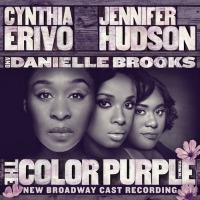 Original Broadway Cast, 2014 (Ghostlight)
Original Broadway Cast, 2014 (Ghostlight)  (4 / 5) Robert James Waller’s novel about an Italian war bride’s brief affair with a photographer who passes through her Iowa town, later adapted as a film that starred Meryl Streep and Clint Eastwood, became a cultural phenomenon and something of a joke in the mid ’90s. While some were swept up in the romance of the story, others rolled their eyes at the corniness of the dialogue and proceedings. The fact that Jason Robert Brown was able to mine a great deal of musical theater gold from this source material — so much so that he won a Tony Award for his efforts — speaks very well of his craft. In the role of Francesca, the Italian housewife, Kelli O’Hara is in top form on the cast album. She wraps her silvery soprano around Brown’s gorgeous melodies, all the while giving a mature, grounded performance that makes songs like “Almost Real” and “Look at Me” particularly moving. Steven Pasquale is every bit her equal as Robert, the photographer with whom Francesca falls deeply in love; his glorious baritone is rich, strong, and masculine, bringing to mind classic leading men of the Golden Age. Together, these two make the recording essential. Their voices blend to such rapturous effect that their duet “One Second and a Million Miles” is not only the highlight of the whole album, but one of the best love duets written for musical theater in recent years. That said, while the entire score is gorgeous to listen to, the musical loses dramatic steam when Brown and librettist Marsha Norman expand the story to focus on several other characters — and the songs for those characters, though catchy and technically well done, reflect this. The twangy “State Road 21” is a jarring follow up to the wistful “Falling Into You” and is skippable on the album, as are “Something From a Dream” and “Get Closer.” One fine exception is “Another Life,” sung beautifully by Whitney Bashor as Robert’s first wife; the ballad chronicles the couple’s courtship, marriage, and divorce, and it’s the only song that competes with those written for Francesca and Robert. Brown’s orchestrations, for which he won another Tony, are lush without being sentimental, and they have a slight country edge. Even with a few substandard songs, Bridges is true romance whenever O’Hara and Pasquale are front and center. — Matt Koplik
(4 / 5) Robert James Waller’s novel about an Italian war bride’s brief affair with a photographer who passes through her Iowa town, later adapted as a film that starred Meryl Streep and Clint Eastwood, became a cultural phenomenon and something of a joke in the mid ’90s. While some were swept up in the romance of the story, others rolled their eyes at the corniness of the dialogue and proceedings. The fact that Jason Robert Brown was able to mine a great deal of musical theater gold from this source material — so much so that he won a Tony Award for his efforts — speaks very well of his craft. In the role of Francesca, the Italian housewife, Kelli O’Hara is in top form on the cast album. She wraps her silvery soprano around Brown’s gorgeous melodies, all the while giving a mature, grounded performance that makes songs like “Almost Real” and “Look at Me” particularly moving. Steven Pasquale is every bit her equal as Robert, the photographer with whom Francesca falls deeply in love; his glorious baritone is rich, strong, and masculine, bringing to mind classic leading men of the Golden Age. Together, these two make the recording essential. Their voices blend to such rapturous effect that their duet “One Second and a Million Miles” is not only the highlight of the whole album, but one of the best love duets written for musical theater in recent years. That said, while the entire score is gorgeous to listen to, the musical loses dramatic steam when Brown and librettist Marsha Norman expand the story to focus on several other characters — and the songs for those characters, though catchy and technically well done, reflect this. The twangy “State Road 21” is a jarring follow up to the wistful “Falling Into You” and is skippable on the album, as are “Something From a Dream” and “Get Closer.” One fine exception is “Another Life,” sung beautifully by Whitney Bashor as Robert’s first wife; the ballad chronicles the couple’s courtship, marriage, and divorce, and it’s the only song that competes with those written for Francesca and Robert. Brown’s orchestrations, for which he won another Tony, are lush without being sentimental, and they have a slight country edge. Even with a few substandard songs, Bridges is true romance whenever O’Hara and Pasquale are front and center. — Matt Koplik
Category Archives: A-C
Altar Boyz
 Original Off-Broadway Cast, 2005 (Ghostlight/Sh-K-Boom)
Original Off-Broadway Cast, 2005 (Ghostlight/Sh-K-Boom)  (4 / 5) A boisterous, satirical show in the form of a concert by a Christian pop-rock boy band espousing wholesome morality through their music, Altar Boyz speaks to adolescent worries about being different while pointing out the hypocrisy of those who use religion to discriminate. Via Kevin Del Aguila’s brainy, laugh-a-minute book and clever songs by Gary Adler and Michael Patrick Walker, criticisms are not aimed at specific targets, but are subtly suggested through wise questions and stories containing humorous symbolism. In one of the show’s funniest sequences, the “sensitive” boy in the band tells of getting beat up by “Episcopalian thugs” because he is…“Catholic,” then sings a prideful anthem proclaiming his “epiphany.” The others — a tough homeboy, a Latino, a Jew, and a super-cute jock — also get solo turns that side-splittingly spotlight push-button issues through diverse musical styles. At various points in the score, Jesus’s accomplishments are related rap-style, eternal life is explained to a salsa beat, a gospel sound is used to illuminate one boy’s story of being “called” by Jesus on his cell phone, and a hard-driving funk number insists “you gotta’ work on your soul.” Although the songs sound like pop-rock, they are well crafted as musical theater songs, illuminating characters and creating moods. The lyrics are of the witty, informative theatrical variety, not the numbing, repetitive rock ilk; sung with impeccable diction, they’re easy to discern over the energizing, rock-band instrumentation. This cast album represents skillful songwriting in support of the thematic content of a smart show. – Lisa Jo Sagolla
(4 / 5) A boisterous, satirical show in the form of a concert by a Christian pop-rock boy band espousing wholesome morality through their music, Altar Boyz speaks to adolescent worries about being different while pointing out the hypocrisy of those who use religion to discriminate. Via Kevin Del Aguila’s brainy, laugh-a-minute book and clever songs by Gary Adler and Michael Patrick Walker, criticisms are not aimed at specific targets, but are subtly suggested through wise questions and stories containing humorous symbolism. In one of the show’s funniest sequences, the “sensitive” boy in the band tells of getting beat up by “Episcopalian thugs” because he is…“Catholic,” then sings a prideful anthem proclaiming his “epiphany.” The others — a tough homeboy, a Latino, a Jew, and a super-cute jock — also get solo turns that side-splittingly spotlight push-button issues through diverse musical styles. At various points in the score, Jesus’s accomplishments are related rap-style, eternal life is explained to a salsa beat, a gospel sound is used to illuminate one boy’s story of being “called” by Jesus on his cell phone, and a hard-driving funk number insists “you gotta’ work on your soul.” Although the songs sound like pop-rock, they are well crafted as musical theater songs, illuminating characters and creating moods. The lyrics are of the witty, informative theatrical variety, not the numbing, repetitive rock ilk; sung with impeccable diction, they’re easy to discern over the energizing, rock-band instrumentation. This cast album represents skillful songwriting in support of the thematic content of a smart show. – Lisa Jo Sagolla
All Shook Up
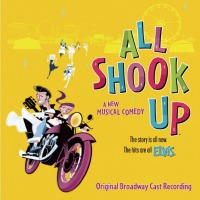 Original Broadway Cast, 2005 (Masterworks Broadway)
Original Broadway Cast, 2005 (Masterworks Broadway)  (2 / 5) A lightweight jukebox musical showcasing 25 songs made famous by Elvis Presley, All Shook Up concerns a motorcycle-riding roustabout who brings romance and rock ‘n’ roll to a dreary Midwestern town in 1955. Flimsily scaffolded by Joe DiPietro’s contrived book, the show contains no original music, thus the value of its cast album lies solely in the degree to which the familiar songs are rendered in new or especially pleasing fashions. Only about a third of the tracks succeed in that respect. The up-tempos fare better than the ballads, most of which are too fast, encumbered by multi-part choral embellishments, and/or robbed of their emotional warmth by strident wailing. The performers don’t try to imitate Elvis, but one almost wishes they could, as it was the velvety beauty of his voice that made Elvis’s renditions of songs like “Love Me Tender” and “Can’t Help Falling in Love” such memorable hits. While none of the cast has a gorgeous enough voice to make those simple melodies as riveting as The King did, Jenn Gambatese (as the roustabout’s love interest, temporarily cross-dressed as a man) gives an impressive interpretation of “A Little Less Conversation,” her bright belt nipping crisply at the rapid-fire lyrics. With arrangements and musical supervision by Stephen Oremus, the album garnishes solo vocals with harmonizing back-up singers and propulsive instrumental breaks, most satisfyingly in “C’mon Everybody,” a “Teddy Bear/Hound Dog” medley, the country-styled “That’s All Right,” and a Motown-flavored “Let Yourself Go.” But the recording’s only true standout numbers are “Jailhouse Rock” and “Burning Love,” classics so intrinsically exciting that they never fail to electrify. — Lisa Jo Sagolla
(2 / 5) A lightweight jukebox musical showcasing 25 songs made famous by Elvis Presley, All Shook Up concerns a motorcycle-riding roustabout who brings romance and rock ‘n’ roll to a dreary Midwestern town in 1955. Flimsily scaffolded by Joe DiPietro’s contrived book, the show contains no original music, thus the value of its cast album lies solely in the degree to which the familiar songs are rendered in new or especially pleasing fashions. Only about a third of the tracks succeed in that respect. The up-tempos fare better than the ballads, most of which are too fast, encumbered by multi-part choral embellishments, and/or robbed of their emotional warmth by strident wailing. The performers don’t try to imitate Elvis, but one almost wishes they could, as it was the velvety beauty of his voice that made Elvis’s renditions of songs like “Love Me Tender” and “Can’t Help Falling in Love” such memorable hits. While none of the cast has a gorgeous enough voice to make those simple melodies as riveting as The King did, Jenn Gambatese (as the roustabout’s love interest, temporarily cross-dressed as a man) gives an impressive interpretation of “A Little Less Conversation,” her bright belt nipping crisply at the rapid-fire lyrics. With arrangements and musical supervision by Stephen Oremus, the album garnishes solo vocals with harmonizing back-up singers and propulsive instrumental breaks, most satisfyingly in “C’mon Everybody,” a “Teddy Bear/Hound Dog” medley, the country-styled “That’s All Right,” and a Motown-flavored “Let Yourself Go.” But the recording’s only true standout numbers are “Jailhouse Rock” and “Burning Love,” classics so intrinsically exciting that they never fail to electrify. — Lisa Jo Sagolla
The Color Purple
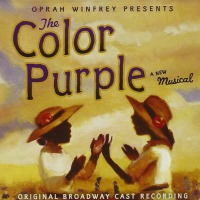 Original Broadway Cast, 2005 (Angel)
Original Broadway Cast, 2005 (Angel)  (3 / 5) Based on the Pulitzer Prize winning novel by Alice Walker, The Color Purple is a work with a lot of heart that was sadly compromised in its original Broadway production by the attempt to present it as a grand, epic musical. Though all of the songwriters are well established in the pop and R&B world, this was the first musical theater score by Brenda Russell, Allee Willis, and Stephen Bray. For the most part, their efforts are worthy. The lyrics are smart and clean, but occasionally heavy handed when leaning towards the poetic. The music, however, is consistently strong, and provides various flavors of jazz, gospel, and soul. LaChanze was given the daunting task of playing Celie, a poor woman who goes through a series of devastating life events, starting the musical at the age of 14 and ending well into her 50s. Acting-wise, the star is up for the task; she wears her heart on her sleeve, and has done the work to specify for the listener what age Celie is at any given moment. However, LaChanze is not always equal to the vocal demands of the score; she’s at her best in the quieter moments (“Our Prayer”), but her two biggest numbers (“What About Love” and “I’m Here”) don’t pack the wallop that they should, because she doesn’t sound completely comfortable from a vocal standpoint. The rest of the cast — including Felicia P. Fields, Elisabeth Withers-Mendes, Renée Elise Goldsberry, and Brandon Victor Dixon — are all vocally gifted, but they perform rather broadly. Too often in this recording, characters come across as caricatures of their literary counterparts, undermining their contribution to Walker’s powerful story. Also, in a rare misstep for Jonathan Tunick, the orchestrations are often busy, seeming to have taken too big a cue from Quincy Jones’s sweeping compositions for the film. This is not a bad score or even a bad recording, but when it’s over, you may be smiling with appreciation rather than wiping away a tear. — Matt Koplik
(3 / 5) Based on the Pulitzer Prize winning novel by Alice Walker, The Color Purple is a work with a lot of heart that was sadly compromised in its original Broadway production by the attempt to present it as a grand, epic musical. Though all of the songwriters are well established in the pop and R&B world, this was the first musical theater score by Brenda Russell, Allee Willis, and Stephen Bray. For the most part, their efforts are worthy. The lyrics are smart and clean, but occasionally heavy handed when leaning towards the poetic. The music, however, is consistently strong, and provides various flavors of jazz, gospel, and soul. LaChanze was given the daunting task of playing Celie, a poor woman who goes through a series of devastating life events, starting the musical at the age of 14 and ending well into her 50s. Acting-wise, the star is up for the task; she wears her heart on her sleeve, and has done the work to specify for the listener what age Celie is at any given moment. However, LaChanze is not always equal to the vocal demands of the score; she’s at her best in the quieter moments (“Our Prayer”), but her two biggest numbers (“What About Love” and “I’m Here”) don’t pack the wallop that they should, because she doesn’t sound completely comfortable from a vocal standpoint. The rest of the cast — including Felicia P. Fields, Elisabeth Withers-Mendes, Renée Elise Goldsberry, and Brandon Victor Dixon — are all vocally gifted, but they perform rather broadly. Too often in this recording, characters come across as caricatures of their literary counterparts, undermining their contribution to Walker’s powerful story. Also, in a rare misstep for Jonathan Tunick, the orchestrations are often busy, seeming to have taken too big a cue from Quincy Jones’s sweeping compositions for the film. This is not a bad score or even a bad recording, but when it’s over, you may be smiling with appreciation rather than wiping away a tear. — Matt KoplikBroadway Cast, 20015 (Broadway Records)  (5 / 5) Well, this is different. In bringing The Color Purple back to Broadway in a stripped down, bare-essentials production, director John Doyle — a master of simplicity — shed a whole new light on the musical and exposed all of its hidden qualities. In terms of the actual material, there’s not much difference between this revival and what was presented 10 years previously; but the approach is vastly different, and that’s why the production and the recording are a revelation. The cast — including TV star Danielle Brooks and Oscar winner Jennifer Hudson, both making their Broadway debuts — finds the humanity that make these characters resonate so deeply. Their powerful acting is reflected in their singing voices, as they attack the score with a ferocity rarely heard on Broadway. While everyone in the cast is stellar, British newcomer Cynthia Erivo is the major find here. Erivo’s Celie may experience brutality and devastation, but she is never a victim. She has strength, humor, and grit; her unstoppable voice can whisper with hurt or soar in triumph, making the 11 o’clock number “I’m Here” the tour de force it was meant to be. Special attention should also be given to the orchestrations of Joseph Joubert, who has removed the fussiness of Jonathan Tunick’s originals and instead has made the orchestra function as a support system (albeit one with great color and versatility), so that the characters are truly front and center. It’s rare for a revival cast recording to be preferable to the original, especially when the revival is significantly smaller in size. But sometimes, with a dynamic cast, a smart director, and a gifted orchestrator, miracles happen. — M.K
(5 / 5) Well, this is different. In bringing The Color Purple back to Broadway in a stripped down, bare-essentials production, director John Doyle — a master of simplicity — shed a whole new light on the musical and exposed all of its hidden qualities. In terms of the actual material, there’s not much difference between this revival and what was presented 10 years previously; but the approach is vastly different, and that’s why the production and the recording are a revelation. The cast — including TV star Danielle Brooks and Oscar winner Jennifer Hudson, both making their Broadway debuts — finds the humanity that make these characters resonate so deeply. Their powerful acting is reflected in their singing voices, as they attack the score with a ferocity rarely heard on Broadway. While everyone in the cast is stellar, British newcomer Cynthia Erivo is the major find here. Erivo’s Celie may experience brutality and devastation, but she is never a victim. She has strength, humor, and grit; her unstoppable voice can whisper with hurt or soar in triumph, making the 11 o’clock number “I’m Here” the tour de force it was meant to be. Special attention should also be given to the orchestrations of Joseph Joubert, who has removed the fussiness of Jonathan Tunick’s originals and instead has made the orchestra function as a support system (albeit one with great color and versatility), so that the characters are truly front and center. It’s rare for a revival cast recording to be preferable to the original, especially when the revival is significantly smaller in size. But sometimes, with a dynamic cast, a smart director, and a gifted orchestrator, miracles happen. — M.K
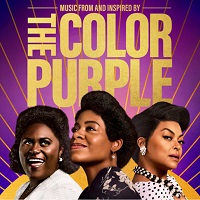 Film Soundtrack, 2023 (WaterTower Music)
Film Soundtrack, 2023 (WaterTower Music)  (2 / 5) News of a movie adaptation of the stage musical version of The Color Purple was met with both cautious optimism and tempered anger. Devoted fans of Spielberg’s original film were confused by what they felt was an unnecessary remake, but after the revelation of the 2016 Broadway revival of the musical, theater fans were eager to see that material brought to the big screen. Unfortunately, more than half of the Broadway score was cut for the movie. Drastic changes to the scores of stage musicals for screen adaptations are nothing new, but the cuts here make very little sense — and what’s worse, the new songs that have replaced the missing ones are painfully inferior. As for the songs that have been kept from the stage show, they have been given new arrangements that are often listenable but rarely compelling. While the cast is jam packed with talent, many of these fantastic performers are underused. For example, Corey Hawkins is a charming and subtly sexy Harpo, but you’ll wish you could hear him sing “Brown Betty” and “Any Little Thing.” And though Halle Bailey, who starred in the live-action remake of Disney’s The Little Mermaid, makes a welcome movie musical return as Nettie, you long to hear her silky voice in “Our Prayer” and “African Homeland” rather than the forgettable “Keep It Movin’.” As Celie, Fantasia Barrino communicates the appropriate amount of pain and resilience, but too much material has been cut for her to make the lasting impression she did when she played this role as a replacement in the original Broadway production of the musical. That said, she does land “I’m Here” well. Danielle Brooks reprises her Broadway revival role of Sofia, and Oscar nominee Taraji P Henson is on hand as Shug Avery. Both bring to their tracks the heat and precision that’s often missing from the rest of this album; Brooks’ “Hell No” might be the best recorded version of that song to date, and Henson’s “Push Da Button” has enough sexual steam to fog up your speakers. When they take command, you get a sense of how great this movie and its soundtrack recording could have been. — M.K.
(2 / 5) News of a movie adaptation of the stage musical version of The Color Purple was met with both cautious optimism and tempered anger. Devoted fans of Spielberg’s original film were confused by what they felt was an unnecessary remake, but after the revelation of the 2016 Broadway revival of the musical, theater fans were eager to see that material brought to the big screen. Unfortunately, more than half of the Broadway score was cut for the movie. Drastic changes to the scores of stage musicals for screen adaptations are nothing new, but the cuts here make very little sense — and what’s worse, the new songs that have replaced the missing ones are painfully inferior. As for the songs that have been kept from the stage show, they have been given new arrangements that are often listenable but rarely compelling. While the cast is jam packed with talent, many of these fantastic performers are underused. For example, Corey Hawkins is a charming and subtly sexy Harpo, but you’ll wish you could hear him sing “Brown Betty” and “Any Little Thing.” And though Halle Bailey, who starred in the live-action remake of Disney’s The Little Mermaid, makes a welcome movie musical return as Nettie, you long to hear her silky voice in “Our Prayer” and “African Homeland” rather than the forgettable “Keep It Movin’.” As Celie, Fantasia Barrino communicates the appropriate amount of pain and resilience, but too much material has been cut for her to make the lasting impression she did when she played this role as a replacement in the original Broadway production of the musical. That said, she does land “I’m Here” well. Danielle Brooks reprises her Broadway revival role of Sofia, and Oscar nominee Taraji P Henson is on hand as Shug Avery. Both bring to their tracks the heat and precision that’s often missing from the rest of this album; Brooks’ “Hell No” might be the best recorded version of that song to date, and Henson’s “Push Da Button” has enough sexual steam to fog up your speakers. When they take command, you get a sense of how great this movie and its soundtrack recording could have been. — M.K.
A Class Act
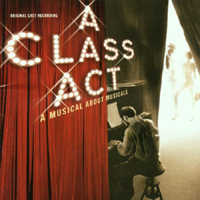 Original Off-Broadway Cast, 2001 (RCA)
Original Off-Broadway Cast, 2001 (RCA)  (3 / 5) A Class Act represents an important bit of modern musical theater history, and this recording of the Manhattan Theatre Club production is an intriguing artifact, documenting the original, intimate approach to the material that was changed when a move to Broadway necessitated bigger laughs, bigger emotions, and bigger orchestrations. The show is a warmhearted tribute to composer-lyricist Edward Kleban, who died in 1987. For those who know only his work as the lyricist of A Chorus Line, the fine handle on composition that Kleban displays here may come as a surprise. The songs assembled for A Class Act — orchestrated by Larry Hochman under Todd Ellison’s musical direction — show Kleban’s impressive talent in dealing with a variety of subjects, ranging from music and musicals (“One More Beautiful Song,” “Charm Song”) to the City of Lights (“Paris Through the Window”) to the complexities of human relationships (“Under Separate Cover,” “Self Portrait”). There are also a couple of traditional, all-out showstoppers: “Gauguin’s Shoes” and “Better.” A fine, laid-back band and an eight-person cast led by director Lonny Price (as Kleban) and Carolee Carmello give all of the songs wonderful performances, but Tony-winner Randy Graff steals the show and listeners’ hearts with her emotional renditions of the score’s most sensitive numbers, including one true classic: “The Next Best Thing to Love.” — Matthew Murray
(3 / 5) A Class Act represents an important bit of modern musical theater history, and this recording of the Manhattan Theatre Club production is an intriguing artifact, documenting the original, intimate approach to the material that was changed when a move to Broadway necessitated bigger laughs, bigger emotions, and bigger orchestrations. The show is a warmhearted tribute to composer-lyricist Edward Kleban, who died in 1987. For those who know only his work as the lyricist of A Chorus Line, the fine handle on composition that Kleban displays here may come as a surprise. The songs assembled for A Class Act — orchestrated by Larry Hochman under Todd Ellison’s musical direction — show Kleban’s impressive talent in dealing with a variety of subjects, ranging from music and musicals (“One More Beautiful Song,” “Charm Song”) to the City of Lights (“Paris Through the Window”) to the complexities of human relationships (“Under Separate Cover,” “Self Portrait”). There are also a couple of traditional, all-out showstoppers: “Gauguin’s Shoes” and “Better.” A fine, laid-back band and an eight-person cast led by director Lonny Price (as Kleban) and Carolee Carmello give all of the songs wonderful performances, but Tony-winner Randy Graff steals the show and listeners’ hearts with her emotional renditions of the score’s most sensitive numbers, including one true classic: “The Next Best Thing to Love.” — Matthew Murray
City of Angels
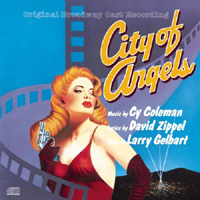 Original Broadway Cast, 1990 (Columbia/Sony)
Original Broadway Cast, 1990 (Columbia/Sony)  (5 / 5) Cy Coleman’s blending of 1940s musical styles — swing, blues, film noir soundtrack, and more — with David Zippel’s deft and witty lyrics helped make City of Angels one of the best musicals of the 1980s. This excellent recording preserves Billy Byers’ hot orchestrations and the performances of an almost ideal cast. Gregg Edelman’s rich, rangy baritone is exciting in the songs written for author/screenwriter Stine; René Auberjonois finds plenty of oily comedy in the role of Buddy Fidler, flim-flam film producer extraordinaire; and Scott Waara’s smooth tones are ideal for radio crooner Jimmy Powers. Rachel York as Mallory and Dee Hoty as Alaura both give dynamic performances, but Hoty is hampered by the exclusion from the recording of one of her big numbers. The major standouts are the show’s Tony winners: James Naughton’s easygoing manner and voice are just right for film detective Stone; and Randy Graff, playing two “Girl Friday”-type secretaries, walks away with the show’s brashest and funniest number, “You Can Always Count on Me.” The Naughton-Edelman duet “You’re Nothing Without Me” is another highlight. Only Kay McClelland, playing both Stine’s wife and Stone’s longtime flame, is just adequate, although her two songs — “It Needs Work” and the torchy “With Every Breath I Take” — are well written. The cast album’s most significant flaw is the omission of much material that would have balanced the characters and illuminated the show’s razor-sharp humor. Still, this is an essential recording of a top-notch Coleman score. Don’t stop listening until “Double Talk Walk,” some of Broadway’s best-ever exit music, has finished playing. — Matthew Murray
(5 / 5) Cy Coleman’s blending of 1940s musical styles — swing, blues, film noir soundtrack, and more — with David Zippel’s deft and witty lyrics helped make City of Angels one of the best musicals of the 1980s. This excellent recording preserves Billy Byers’ hot orchestrations and the performances of an almost ideal cast. Gregg Edelman’s rich, rangy baritone is exciting in the songs written for author/screenwriter Stine; René Auberjonois finds plenty of oily comedy in the role of Buddy Fidler, flim-flam film producer extraordinaire; and Scott Waara’s smooth tones are ideal for radio crooner Jimmy Powers. Rachel York as Mallory and Dee Hoty as Alaura both give dynamic performances, but Hoty is hampered by the exclusion from the recording of one of her big numbers. The major standouts are the show’s Tony winners: James Naughton’s easygoing manner and voice are just right for film detective Stone; and Randy Graff, playing two “Girl Friday”-type secretaries, walks away with the show’s brashest and funniest number, “You Can Always Count on Me.” The Naughton-Edelman duet “You’re Nothing Without Me” is another highlight. Only Kay McClelland, playing both Stine’s wife and Stone’s longtime flame, is just adequate, although her two songs — “It Needs Work” and the torchy “With Every Breath I Take” — are well written. The cast album’s most significant flaw is the omission of much material that would have balanced the characters and illuminated the show’s razor-sharp humor. Still, this is an essential recording of a top-notch Coleman score. Don’t stop listening until “Double Talk Walk,” some of Broadway’s best-ever exit music, has finished playing. — Matthew Murray
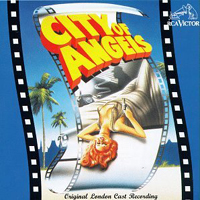 Original London Cast, 1993 (RCA)
Original London Cast, 1993 (RCA)  (2 / 5) With almost every important musical moment of City of Angels captured, and enough of Larry Gelbart’s incisive dialogue included to set the scenes, this is the kind of recording that should have been made of the original Broadway production. Unfortunately, the performances here leave much to be desired, with most of the cast over-emoting in both speech and song. Henry Goodman, superb as Buddy, makes this work only because his character is so far over-the-top to begin with. The style feels far less organic to the other performances, with Roger Allam a particularly uncomfortable Stone and Susannah Fellows (Alaura), Fiona Hendley (Gabbi/ Bobbi), and Haydn Gwynne (Oolie/Donna) doing little better. Martin Smith keeps his Stine grounded, but his 11-o’clock number, “Funny,” is a restrained disappointment here. Even if the cast’s problems with American accents and 1940s speech patterns come through, this recording’s more thorough documentation of the score makes it useful as a companion, if not a substitute, for the otherwise superior Broadway recording. — M.M.
(2 / 5) With almost every important musical moment of City of Angels captured, and enough of Larry Gelbart’s incisive dialogue included to set the scenes, this is the kind of recording that should have been made of the original Broadway production. Unfortunately, the performances here leave much to be desired, with most of the cast over-emoting in both speech and song. Henry Goodman, superb as Buddy, makes this work only because his character is so far over-the-top to begin with. The style feels far less organic to the other performances, with Roger Allam a particularly uncomfortable Stone and Susannah Fellows (Alaura), Fiona Hendley (Gabbi/ Bobbi), and Haydn Gwynne (Oolie/Donna) doing little better. Martin Smith keeps his Stine grounded, but his 11-o’clock number, “Funny,” is a restrained disappointment here. Even if the cast’s problems with American accents and 1940s speech patterns come through, this recording’s more thorough documentation of the score makes it useful as a companion, if not a substitute, for the otherwise superior Broadway recording. — M.M.
A Chorus Line
 Original Broadway Cast, 1975 (Columbia/Masterworks Broadway)
Original Broadway Cast, 1975 (Columbia/Masterworks Broadway)  (5 / 5) In 1975, A Chorus Line was a phenomenon. The conception of the show began with Broadway wunderkind Michael Bennett’s idea that there might be a musical to be made from the stories of the lives of Broadway’s dancers, a group that was undervalued and overlooked at the time. Bennett got together a bunch of these “gypsies,” many of whom would go on to be in the original company of A Chorus Line, and urged everyone to talk about their lives, all the while taping the conversations. From those tapes, Bennett along with librettists James Kirkwood and Nicholas Dante, composer Marvin Hamlisch, and lyricist Edward Kleban shaped the material through a series of workshops at The Public Theater. Both achingly real and thrillingly theatrical, the show premiered there to ecstatic reviews and quickly moved to Broadway, where it became a massive hit. The setting is an open audition of dancers for an unnamed Broadway musical, during which the show’s director, Zach, sets his final 16 hopefuls in a line and proceeds to inquire about their lives. Some of the dancers offer humorous anecdotes (“I Can Do That”), others share painful stories (the moving “At the Ballet”). From beginning to end, this original Broadway cast recording feels like lightning in a bottle. The definitive cast performs with a gumption that’s palpable to the listener, expressing each character’s desire to dance and their need get the job. As Cassie, a veteran dancer who’s hoping for a second chance at her career and who also has a complicated history with Zach, Donna Mckechnie is exceptional. (She won a Tony Award for her performance. )Though we don’t get to see any of her beautiful dancing here, her vocals are the most impressive of any Cassie, and the sheer desperation in her delivery of “The Music and the Mirror” resonates deeply. There’s also Priscilla Lopez as the bouncy Diana, Kelly Bishop as the cynical yet vulnerable Sheila, Sammy Williams as the conflicted Paul, and Pamela Blair as the brassy Val — but, truthfully one could keep going on and on about each cast member’s contribution. The score remains a classic, with Kleban’s conversational lyrics seamlessly flowing in and out of dialogue as Hamlisch’s melodies display great variety in style and emotion, from pulsating anxiety (the opening “I Hope I Get It”) to classic show biz razzle-dazzle (the finale ,“One”). Though the grand montage “Hello Twelve, Hello, Thirteen, Hello Love” is only represented here in chunks, and the music-and-dialogue sequence “And…” wasn’t recorded at all, there are no serious complaints about this truly great cast album. Fun fact: Due to the small budgets for the workshops, Bennett was unable to afford a solo orchestrator to work on the entire show, so he instead hired three — masters Hershy Kay, Jonathan Tunick, and Bill Byers — to individually orchestrate various musical numbers. The fact that the work of these three men never feels disjointed and comes together as a beautiful whole is representative of the theme of A Chorus Line in general. — Matt Koplik
(5 / 5) In 1975, A Chorus Line was a phenomenon. The conception of the show began with Broadway wunderkind Michael Bennett’s idea that there might be a musical to be made from the stories of the lives of Broadway’s dancers, a group that was undervalued and overlooked at the time. Bennett got together a bunch of these “gypsies,” many of whom would go on to be in the original company of A Chorus Line, and urged everyone to talk about their lives, all the while taping the conversations. From those tapes, Bennett along with librettists James Kirkwood and Nicholas Dante, composer Marvin Hamlisch, and lyricist Edward Kleban shaped the material through a series of workshops at The Public Theater. Both achingly real and thrillingly theatrical, the show premiered there to ecstatic reviews and quickly moved to Broadway, where it became a massive hit. The setting is an open audition of dancers for an unnamed Broadway musical, during which the show’s director, Zach, sets his final 16 hopefuls in a line and proceeds to inquire about their lives. Some of the dancers offer humorous anecdotes (“I Can Do That”), others share painful stories (the moving “At the Ballet”). From beginning to end, this original Broadway cast recording feels like lightning in a bottle. The definitive cast performs with a gumption that’s palpable to the listener, expressing each character’s desire to dance and their need get the job. As Cassie, a veteran dancer who’s hoping for a second chance at her career and who also has a complicated history with Zach, Donna Mckechnie is exceptional. (She won a Tony Award for her performance. )Though we don’t get to see any of her beautiful dancing here, her vocals are the most impressive of any Cassie, and the sheer desperation in her delivery of “The Music and the Mirror” resonates deeply. There’s also Priscilla Lopez as the bouncy Diana, Kelly Bishop as the cynical yet vulnerable Sheila, Sammy Williams as the conflicted Paul, and Pamela Blair as the brassy Val — but, truthfully one could keep going on and on about each cast member’s contribution. The score remains a classic, with Kleban’s conversational lyrics seamlessly flowing in and out of dialogue as Hamlisch’s melodies display great variety in style and emotion, from pulsating anxiety (the opening “I Hope I Get It”) to classic show biz razzle-dazzle (the finale ,“One”). Though the grand montage “Hello Twelve, Hello, Thirteen, Hello Love” is only represented here in chunks, and the music-and-dialogue sequence “And…” wasn’t recorded at all, there are no serious complaints about this truly great cast album. Fun fact: Due to the small budgets for the workshops, Bennett was unable to afford a solo orchestrator to work on the entire show, so he instead hired three — masters Hershy Kay, Jonathan Tunick, and Bill Byers — to individually orchestrate various musical numbers. The fact that the work of these three men never feels disjointed and comes together as a beautiful whole is representative of the theme of A Chorus Line in general. — Matt Koplik
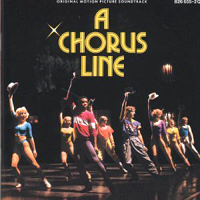 Film Soundtrack, 1985 (Casablanca/Polygram) No stars; not recommended. With its inherent theatricality and non-traditional story structure, A Chorus Line was always going to be a difficult property to adapt for the screen, even in the best of hands. But that hardly excuses Richard Attenborough’s bafflingly misguided interpretation. The soundtrack recording provides numerous examples of the film’s wrongdoings, which include giving “What I Did For Love” to Cassie as a solo and replacing “The Music and the Mirror” and the “Hello Twelve…” montage with, respectively, the inferior “Let Me Dance For You” and “Surprise, Surprise.” Also unfortunate are Ralph Burns’ synthesizer-heavy orchestrations. In fairness to Burns, though his work here is busy and rather cheap sounding, anyone who watches the movie (but why would you?) can see that the director and producers were aiming for a hip, modern, ’80s look and sound, so it’s likely they imposed that vision on the Broadway-favorite orchestrator. Director Attenborough managed to cast an able company of dancers, but his and screenwriter Arnold Schulman’s terrible creative decisions bar any of them from truly succeeding. While Allyson Reed does a commendable job as Cassie, having her sing the show’s anthem, “What I Did For Love,” as a solo was, as noted, a huge misstep; it robs the company of the proud defense of their sacrifice for their art and instead puts a tighter spotlight on Cassie, so that the story suddenly becomes very specific rather than achieving the universality that Michael Bennett fought hard for in the original stage show. Similarly, while Gregg Burge as Richie does his best with “Surprise, Surprise,” that number focuses purely on one character’s sexual awakening, rather than offering detailed glimpses into the adolescence (the pain, the humiliation, the joy) of each dancer on the line. For film students, A Chorus Line provides a textbook example of how not to adapt a successful musical to the screen. For Broadway fans, you’re better off pretending this soundtrack recording doesn’t exist. — M.K.
Film Soundtrack, 1985 (Casablanca/Polygram) No stars; not recommended. With its inherent theatricality and non-traditional story structure, A Chorus Line was always going to be a difficult property to adapt for the screen, even in the best of hands. But that hardly excuses Richard Attenborough’s bafflingly misguided interpretation. The soundtrack recording provides numerous examples of the film’s wrongdoings, which include giving “What I Did For Love” to Cassie as a solo and replacing “The Music and the Mirror” and the “Hello Twelve…” montage with, respectively, the inferior “Let Me Dance For You” and “Surprise, Surprise.” Also unfortunate are Ralph Burns’ synthesizer-heavy orchestrations. In fairness to Burns, though his work here is busy and rather cheap sounding, anyone who watches the movie (but why would you?) can see that the director and producers were aiming for a hip, modern, ’80s look and sound, so it’s likely they imposed that vision on the Broadway-favorite orchestrator. Director Attenborough managed to cast an able company of dancers, but his and screenwriter Arnold Schulman’s terrible creative decisions bar any of them from truly succeeding. While Allyson Reed does a commendable job as Cassie, having her sing the show’s anthem, “What I Did For Love,” as a solo was, as noted, a huge misstep; it robs the company of the proud defense of their sacrifice for their art and instead puts a tighter spotlight on Cassie, so that the story suddenly becomes very specific rather than achieving the universality that Michael Bennett fought hard for in the original stage show. Similarly, while Gregg Burge as Richie does his best with “Surprise, Surprise,” that number focuses purely on one character’s sexual awakening, rather than offering detailed glimpses into the adolescence (the pain, the humiliation, the joy) of each dancer on the line. For film students, A Chorus Line provides a textbook example of how not to adapt a successful musical to the screen. For Broadway fans, you’re better off pretending this soundtrack recording doesn’t exist. — M.K.
 Broadway Cast, 2006 (Masterworks Broadway)
Broadway Cast, 2006 (Masterworks Broadway)  (3 / 5) If the original cast album of A Chorus Line provides a rush of adrenaline, this respectful recording plays like a reference guide for those who might be new to the score. Just about every note and every lyric is carefully set down — though “And…” is still sadly unrepresented — with a cast that makes sure not to impose negatively on the Chorus Line legacy. While this approach is a far more welcome alternative to that of the disastrous movie version, it makes for a rather bland recording. From the piano intro of “I Hope I Get It” through to the grand finale, “One,” the listener can sense the conductor, cast, and orchestra taking great pains to not have a single hair out of place. This delicate attitude takes away much of the energy and urgency that make A Chorus Line so compelling, and it keeps most of the very talented company from putting their own personal spin on their characters. That said, there are some major highlights here. As Diana, Natalie Cortez offers an impassioned and vulnerable interpretation of “Nothing,” and if Jessica Lee Goldyn isn’t quite as brassy as Pamela Blair, her “Dance: Ten, Looks: Three” is comically endearing. Best of all, for the first time, the “Hello Twelve…” montage is recorded in its nearly 20 minute entirety! If nothing else, that alone makes this recording essential for Broadway fans. — M.K.
(3 / 5) If the original cast album of A Chorus Line provides a rush of adrenaline, this respectful recording plays like a reference guide for those who might be new to the score. Just about every note and every lyric is carefully set down — though “And…” is still sadly unrepresented — with a cast that makes sure not to impose negatively on the Chorus Line legacy. While this approach is a far more welcome alternative to that of the disastrous movie version, it makes for a rather bland recording. From the piano intro of “I Hope I Get It” through to the grand finale, “One,” the listener can sense the conductor, cast, and orchestra taking great pains to not have a single hair out of place. This delicate attitude takes away much of the energy and urgency that make A Chorus Line so compelling, and it keeps most of the very talented company from putting their own personal spin on their characters. That said, there are some major highlights here. As Diana, Natalie Cortez offers an impassioned and vulnerable interpretation of “Nothing,” and if Jessica Lee Goldyn isn’t quite as brassy as Pamela Blair, her “Dance: Ten, Looks: Three” is comically endearing. Best of all, for the first time, the “Hello Twelve…” montage is recorded in its nearly 20 minute entirety! If nothing else, that alone makes this recording essential for Broadway fans. — M.K.
A Christmas Carol
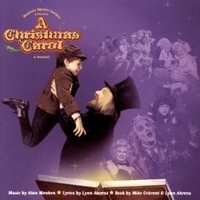 Original Stage Cast, 1993 (Columbia/Sony)
Original Stage Cast, 1993 (Columbia/Sony)  (3 / 5) The Alan Menken-Lynn Ahrens musical version of A Christmas Carol lit up Madison Square Garden for 10 seasons, and though the production’s spectacle played a vital role in its success, this recording documents the fact that an enjoyable score may also have had something to do with it. The adaptation is very straightforward; Menken and Ahrens’ took few liberties with Charles Dickens’ classic story. There are the requisite numbers for Scrooge’s feelings about Christmas as compared with those of his neighbors, his meetings with the ghosts of Christmases past, present, and future, and his eventual change of heart. The score is unremarkable, but that’s OK; songs like “The Lights of Long Ago” and “Christmas Together” are pleasant enough, “Mr. Fezziwig’s Annual Christmas Ball” is an attractive toe-tapper, and “A Place Called Home” is a charming, tuneful duet for the young-adult Scrooge and his lady love. Walter Charles is nothing short of ideal as Scrooge, acting and singing with all the necessary crotchety conviction. He leads a cast that includes such Broadway names as Christopher Sieber, Bill Nolte, Robert Westenberg, Ken Jennings, and Emily Skinner. This recording makes for an enjoyable, if not quite essential, listen during the holidays or at any other time of the year. — Matthew Murray
(3 / 5) The Alan Menken-Lynn Ahrens musical version of A Christmas Carol lit up Madison Square Garden for 10 seasons, and though the production’s spectacle played a vital role in its success, this recording documents the fact that an enjoyable score may also have had something to do with it. The adaptation is very straightforward; Menken and Ahrens’ took few liberties with Charles Dickens’ classic story. There are the requisite numbers for Scrooge’s feelings about Christmas as compared with those of his neighbors, his meetings with the ghosts of Christmases past, present, and future, and his eventual change of heart. The score is unremarkable, but that’s OK; songs like “The Lights of Long Ago” and “Christmas Together” are pleasant enough, “Mr. Fezziwig’s Annual Christmas Ball” is an attractive toe-tapper, and “A Place Called Home” is a charming, tuneful duet for the young-adult Scrooge and his lady love. Walter Charles is nothing short of ideal as Scrooge, acting and singing with all the necessary crotchety conviction. He leads a cast that includes such Broadway names as Christopher Sieber, Bill Nolte, Robert Westenberg, Ken Jennings, and Emily Skinner. This recording makes for an enjoyable, if not quite essential, listen during the holidays or at any other time of the year. — Matthew Murray
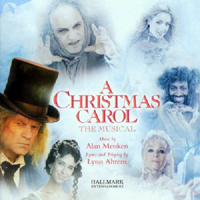 Television Cast, 2004 (JAY)
Television Cast, 2004 (JAY)  (3 / 5) Television adaptations of musicals are frequently mixed bags, given the perceived need for stars whom viewers will instantly recognize but who may or may not be well suited to their roles. However, many of the casting choices made for the 2004 Hallmark Entertainment version of the Menken-Ahrens A Christmas Carol were as savvy as they were starry, and this recording captures the best of their work. Jane Krakowski’s focused, empathetic performance as the Ghost of Christmas Past makes her big solo, “The Lights of Long Ago,” a major highlight. Jason Alexander is a showily threatening Marley. Jesse L. Martin is obviously having a ball as the Ghost of Christmas Present, and his “Abundance and Charity” is abundant with joy. Edward Gower and Jacob Moriarty sound just right as Bob Cratchit and Tiny Tim, respectively. Stage favorites Brian Bedford, Claire Moore, Linzi Hately, and Ruthie Henshall score in their smaller roles, the last particularly so as Scrooge’s Mother, delivering a lovely and poignant “God Bless Us Everyone.” On the recording, Scrooge is a somewhat diminished presence, so you don’t hear a ton of Kelsey Grammer, but what’s here is loaded with well-calculated grump if not all the gusto one wants from the role. A lush, full orchestra plays Michael Starobin’s lively orchestrations under the baton of Michael Kosarin. — M.M.
(3 / 5) Television adaptations of musicals are frequently mixed bags, given the perceived need for stars whom viewers will instantly recognize but who may or may not be well suited to their roles. However, many of the casting choices made for the 2004 Hallmark Entertainment version of the Menken-Ahrens A Christmas Carol were as savvy as they were starry, and this recording captures the best of their work. Jane Krakowski’s focused, empathetic performance as the Ghost of Christmas Past makes her big solo, “The Lights of Long Ago,” a major highlight. Jason Alexander is a showily threatening Marley. Jesse L. Martin is obviously having a ball as the Ghost of Christmas Present, and his “Abundance and Charity” is abundant with joy. Edward Gower and Jacob Moriarty sound just right as Bob Cratchit and Tiny Tim, respectively. Stage favorites Brian Bedford, Claire Moore, Linzi Hately, and Ruthie Henshall score in their smaller roles, the last particularly so as Scrooge’s Mother, delivering a lovely and poignant “God Bless Us Everyone.” On the recording, Scrooge is a somewhat diminished presence, so you don’t hear a ton of Kelsey Grammer, but what’s here is loaded with well-calculated grump if not all the gusto one wants from the role. A lush, full orchestra plays Michael Starobin’s lively orchestrations under the baton of Michael Kosarin. — M.M.
Cats
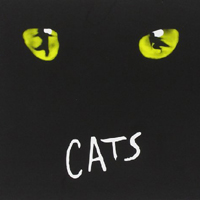 Original London Cast, 1981 (Geffen)
Original London Cast, 1981 (Geffen)  (4 / 5) Before it became a joke, Cats was a true phenomenon. While Trevor Nunn’s direction placed spectacle above emotion and story, the show has a better score than it’s usually given credit for. T. S. Eliot’s Old Possum’s Book of Practical Cats may not have been a natural choice for musicalization; still, Andrew Lloyd Webber found some remarkably creative ways to get Eliot’s feline characters to sing, whether in the style of straight-out pop (“The Rum Tum Tugger”), mock-operetta (“Growltiger’s Last Stand”), or a host of others. The magical (and highly electronic) overture, the rapidly shifting strains of the lengthy first-act Jellicle Ball, and the lush finale “The Ad-Dressing of Cats” all help to make this a musical theater score full of variety and invention. Even the now standard “Memory” works within the weird universe created by the half-posthumous collaboration of Eliot and Lloyd Webber. Here, that song is delivered beautifully by West End diva Elaine Paige as Grizabella, the Glamour Cat — the character who ties together the show’s story about junkyard strays meeting to decide which of them will be reborn into a new, presumably better life. Paul Nicholas’ Rum Tum Tugger, Brian Blessed’s Old Deuteronomy (and Bustopher Jones), and Kenn Wells’ Skimbleshanks also provide lots of fun. This recording of Cats captures the ineffably English tone of the piece, and is a highly entertaining listen. — Matthew Murray
(4 / 5) Before it became a joke, Cats was a true phenomenon. While Trevor Nunn’s direction placed spectacle above emotion and story, the show has a better score than it’s usually given credit for. T. S. Eliot’s Old Possum’s Book of Practical Cats may not have been a natural choice for musicalization; still, Andrew Lloyd Webber found some remarkably creative ways to get Eliot’s feline characters to sing, whether in the style of straight-out pop (“The Rum Tum Tugger”), mock-operetta (“Growltiger’s Last Stand”), or a host of others. The magical (and highly electronic) overture, the rapidly shifting strains of the lengthy first-act Jellicle Ball, and the lush finale “The Ad-Dressing of Cats” all help to make this a musical theater score full of variety and invention. Even the now standard “Memory” works within the weird universe created by the half-posthumous collaboration of Eliot and Lloyd Webber. Here, that song is delivered beautifully by West End diva Elaine Paige as Grizabella, the Glamour Cat — the character who ties together the show’s story about junkyard strays meeting to decide which of them will be reborn into a new, presumably better life. Paul Nicholas’ Rum Tum Tugger, Brian Blessed’s Old Deuteronomy (and Bustopher Jones), and Kenn Wells’ Skimbleshanks also provide lots of fun. This recording of Cats captures the ineffably English tone of the piece, and is a highly entertaining listen. — Matthew Murray
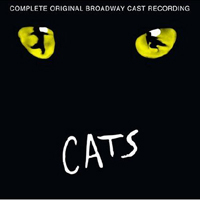 Original Broadway Cast, 1983 (Geffen)
Original Broadway Cast, 1983 (Geffen)  (4 / 5) One of the longest-running musicals in Broadway history, Cats is also the most inherently English of all the mega-musicals of its era, and so the unconvincing Brit accents and American vocal mannerisms of the original Broadway company do not lend this recording much authenticity. Still, with a cast this good, it barely matters. Betty Buckley is a worthy successor to Elaine Paige as Grizabella, and her “Memory” is one of the most powerful on record. (Many singers have recorded the song as a stand-alone piece.) Ken Page is particularly charming as Old Deuteronomy; future stars Terrence Mann and Harry Groener do very good work as the Rum Tum Tugger and Munkustrap; and Timothy Scott and Anna McNeely as Mr. Mistoffelees and Jennyanydots are delightful. Of special note is Stephen Hanan, whose hilarious Bustopher Jones, heartbreaking Gus, and dynamic Growltiger make him a standout. As is the case with the London album, this one is missing a certain amount of material, including some dance music and “The Awful Battle of the Pekes and the Pollicles.” But the superb cast and knockout orchestra, under the musical direction of Stanley Lebowsky, make it sound fresher and more vibrant than its predecessor. — M.M.
(4 / 5) One of the longest-running musicals in Broadway history, Cats is also the most inherently English of all the mega-musicals of its era, and so the unconvincing Brit accents and American vocal mannerisms of the original Broadway company do not lend this recording much authenticity. Still, with a cast this good, it barely matters. Betty Buckley is a worthy successor to Elaine Paige as Grizabella, and her “Memory” is one of the most powerful on record. (Many singers have recorded the song as a stand-alone piece.) Ken Page is particularly charming as Old Deuteronomy; future stars Terrence Mann and Harry Groener do very good work as the Rum Tum Tugger and Munkustrap; and Timothy Scott and Anna McNeely as Mr. Mistoffelees and Jennyanydots are delightful. Of special note is Stephen Hanan, whose hilarious Bustopher Jones, heartbreaking Gus, and dynamic Growltiger make him a standout. As is the case with the London album, this one is missing a certain amount of material, including some dance music and “The Awful Battle of the Pekes and the Pollicles.” But the superb cast and knockout orchestra, under the musical direction of Stanley Lebowsky, make it sound fresher and more vibrant than its predecessor. — M.M.
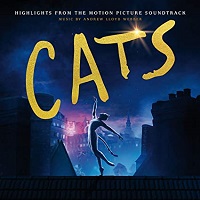 Film Soundtrack, 2020 (Republic) No stars; not recommended. Tom Hooper’s film adaptation of Cats is a true movie musical disaster, the director providing a master class in how to make every wrong artistic decision from the word “go.” As he did with his film version of Les Mis, Hooper once again required his cast, packed with misused talent, to sing live on set, so as to make the performances seem more “authentic” and less “fantastical.” Did no one tell him this was Cats? Part of what made the stage musical a worldwide phenomenon was its ability to take audiences away from reality; not since Attenborough’s A Chorus Line has a director so misunderstood the assignment. Even without watching the CGI hellscape that Hooper created on screen, one can understand why the film is so critically maligned just from listening to this soundtrack album. Every song is sung with trepidation, as if the cast is never sure what their starting note is or if they’ll even have the breath support to get through it. Performers such as Rebel Wilson (“The Old Gumbie Cat”), Laurie Davidson (“Mr. Mistoffelees”), and Sir Ian McKellen (“Gus: The Theatre Cat”) play with the rhythms and note values of their songs so much that they’re practically unidentifiable. The enlarged orchestrations are fussier and somehow sound more dated than the 80’s originals. A new song for the movie, “Beautiful Ghosts,” was written by Webber and Taylor Swift (who also makes a brief appearance singing “Macavity”) and is sung by a clearly embarrassed Francesca Hayward as Victoria; Swift’s lyrics are filled with empty poetry, and Webber’s melody evaporates into the air. On the credit side, Jason Derulo has fun as Rum Tum Tugger, and Jennifer Hudson delivers a solid if not exceptional “Memory.” But with iconic renditions by Elaine Paige and Betty Buckley already preserved, a solid “Memory” isn’t enough to make this soundtrack even tolerable. Better it be taken to the pound. — Matt Koplik
Film Soundtrack, 2020 (Republic) No stars; not recommended. Tom Hooper’s film adaptation of Cats is a true movie musical disaster, the director providing a master class in how to make every wrong artistic decision from the word “go.” As he did with his film version of Les Mis, Hooper once again required his cast, packed with misused talent, to sing live on set, so as to make the performances seem more “authentic” and less “fantastical.” Did no one tell him this was Cats? Part of what made the stage musical a worldwide phenomenon was its ability to take audiences away from reality; not since Attenborough’s A Chorus Line has a director so misunderstood the assignment. Even without watching the CGI hellscape that Hooper created on screen, one can understand why the film is so critically maligned just from listening to this soundtrack album. Every song is sung with trepidation, as if the cast is never sure what their starting note is or if they’ll even have the breath support to get through it. Performers such as Rebel Wilson (“The Old Gumbie Cat”), Laurie Davidson (“Mr. Mistoffelees”), and Sir Ian McKellen (“Gus: The Theatre Cat”) play with the rhythms and note values of their songs so much that they’re practically unidentifiable. The enlarged orchestrations are fussier and somehow sound more dated than the 80’s originals. A new song for the movie, “Beautiful Ghosts,” was written by Webber and Taylor Swift (who also makes a brief appearance singing “Macavity”) and is sung by a clearly embarrassed Francesca Hayward as Victoria; Swift’s lyrics are filled with empty poetry, and Webber’s melody evaporates into the air. On the credit side, Jason Derulo has fun as Rum Tum Tugger, and Jennifer Hudson delivers a solid if not exceptional “Memory.” But with iconic renditions by Elaine Paige and Betty Buckley already preserved, a solid “Memory” isn’t enough to make this soundtrack even tolerable. Better it be taken to the pound. — Matt Koplik
Caroline, or Change
 Original Broadway Cast, 2004 (Hollywood Records, 2CDs)
Original Broadway Cast, 2004 (Hollywood Records, 2CDs)  (4 / 5) Tony Kushner writing the book and lyrics for a musical full of inanimate objects? If you did not see Caroline, or Change onstage, you may have difficulty getting past the novelty of a singing washing machine, dryer, radio, bus, and moon — but once you do, this show is revealed to be an attractive and often emotionally explosive folk opera. Jeanine Tesori supplies intriguing and highly listenable music, heavily steeped in the styles of the show’s 1963 setting, for this tale about the relationship between a black woman named Caroline Thibodeaux and the southern Jewish family that employs her as a maid. Tonya Pinkins gives an earth-shaking, all-encompassing performance as Caroline, making the emotionally and musically difficult score sound easy and reaching stratospheric heights in her monumental, five-minute-long, 11-o’clock number “Lot’s Wife.” She receives solid support from such Broadway notables as Veanne Cox, Chuck Cooper, and Alice Playten, while Tony Award-winner Anika Noni Rose is impressive as Caroline’s daughter. Although many of the individual songs are striking in their own right — including the youthfully catchy first-act finale “Roosevelt Petrucius Coleslaw” and “The Chanukah Party,” with its already immortal lyric “Chanukah, oh Chanukah / Oh Dreydl and Menorah! / We celebrate it even though / It isn’t in the Torah!” — this recording is best experienced straight through from beginning to end. — Matthew Murray
(4 / 5) Tony Kushner writing the book and lyrics for a musical full of inanimate objects? If you did not see Caroline, or Change onstage, you may have difficulty getting past the novelty of a singing washing machine, dryer, radio, bus, and moon — but once you do, this show is revealed to be an attractive and often emotionally explosive folk opera. Jeanine Tesori supplies intriguing and highly listenable music, heavily steeped in the styles of the show’s 1963 setting, for this tale about the relationship between a black woman named Caroline Thibodeaux and the southern Jewish family that employs her as a maid. Tonya Pinkins gives an earth-shaking, all-encompassing performance as Caroline, making the emotionally and musically difficult score sound easy and reaching stratospheric heights in her monumental, five-minute-long, 11-o’clock number “Lot’s Wife.” She receives solid support from such Broadway notables as Veanne Cox, Chuck Cooper, and Alice Playten, while Tony Award-winner Anika Noni Rose is impressive as Caroline’s daughter. Although many of the individual songs are striking in their own right — including the youthfully catchy first-act finale “Roosevelt Petrucius Coleslaw” and “The Chanukah Party,” with its already immortal lyric “Chanukah, oh Chanukah / Oh Dreydl and Menorah! / We celebrate it even though / It isn’t in the Torah!” — this recording is best experienced straight through from beginning to end. — Matthew Murray
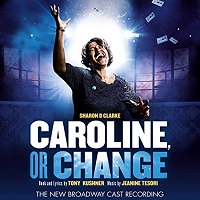 Broadway Cast, 2022 (Broadway Records, 2CDs)
Broadway Cast, 2022 (Broadway Records, 2CDs)  (3 / 5) Caroline, or Change was not properly appreciated when it premiered on Broadway in 2004, as its complex and uncompromising presentation of race relations proved a hard sell for many audiences and critics. In the years since, the musical’s themes have only grown more relevant, and the quality of the material has finally been recognized by its winning the Best Musical Olivier Award for the London premiere production (a transfer from Broadway) and then, years later, via a much-lauded London revival that eventually was brought to Broadway by the Roundabout Theatre Company. That production yielded this new cast recording, and since the revival made many critics change their tune about this near-opera and give it the high praise it always deserved, you’d think that the cast recording would rival or even surpass the original. But while the singing here is stronger overall (Caissie Levy, in particular, is wildly overqualified vocally for the role of Rose Stopnick), there’s a controlled, studied quality to the proceedings that keeps the album from greatness. While director Michael Longhurst’s production included more elaborate staging than George C. Wolfe’s original, and featured some odd design choices, the recording shows that this revival was extremely faithful to the material as written and performed in 2004, even using the same flawless orchestrations. Joseph Joubert, a co-orchestrator on the original, is on hand as music director, conducting the score crisply but with little fire. Sharon D. Clarke, the lone British performer who transferred with the production, is perhaps more in command of her voice than Pinkins, but her Caroline seems more calculatedly mean; whereas the character’s unpleasantness in Pinkins’ performance seemed to stem from pain and exhaustion, Clarke’s Caroline often sounds like a brooding shark, lying in wait to snap at anyone who crosses her path. It’s an interesting interpretation of the role, though arguably less engaging. On the other hand, Tamika Lawrence proves to be a scene stealer as Dotty, and Harper Miles, Nya, and Nasia Thomas tear into the collective role of The Radio with vocal ferocity. For a work as richly rewarding as Caroline, any new interpretation is welcome; so if this recording doesn’t surpass the original, it’s well-enough done to stand alongside it as a point of comparison and an opportunity to explore more facets to this masterwork. — Matt Koplik
(3 / 5) Caroline, or Change was not properly appreciated when it premiered on Broadway in 2004, as its complex and uncompromising presentation of race relations proved a hard sell for many audiences and critics. In the years since, the musical’s themes have only grown more relevant, and the quality of the material has finally been recognized by its winning the Best Musical Olivier Award for the London premiere production (a transfer from Broadway) and then, years later, via a much-lauded London revival that eventually was brought to Broadway by the Roundabout Theatre Company. That production yielded this new cast recording, and since the revival made many critics change their tune about this near-opera and give it the high praise it always deserved, you’d think that the cast recording would rival or even surpass the original. But while the singing here is stronger overall (Caissie Levy, in particular, is wildly overqualified vocally for the role of Rose Stopnick), there’s a controlled, studied quality to the proceedings that keeps the album from greatness. While director Michael Longhurst’s production included more elaborate staging than George C. Wolfe’s original, and featured some odd design choices, the recording shows that this revival was extremely faithful to the material as written and performed in 2004, even using the same flawless orchestrations. Joseph Joubert, a co-orchestrator on the original, is on hand as music director, conducting the score crisply but with little fire. Sharon D. Clarke, the lone British performer who transferred with the production, is perhaps more in command of her voice than Pinkins, but her Caroline seems more calculatedly mean; whereas the character’s unpleasantness in Pinkins’ performance seemed to stem from pain and exhaustion, Clarke’s Caroline often sounds like a brooding shark, lying in wait to snap at anyone who crosses her path. It’s an interesting interpretation of the role, though arguably less engaging. On the other hand, Tamika Lawrence proves to be a scene stealer as Dotty, and Harper Miles, Nya, and Nasia Thomas tear into the collective role of The Radio with vocal ferocity. For a work as richly rewarding as Caroline, any new interpretation is welcome; so if this recording doesn’t surpass the original, it’s well-enough done to stand alongside it as a point of comparison and an opportunity to explore more facets to this masterwork. — Matt Koplik
Bounce
 Original Cast, 2004 (Nonesuch)
Original Cast, 2004 (Nonesuch)  (2 / 5) Stephen Sondheim’s first new musical in nearly a decade, Bounce was highly anticipated when it played Chicago and Washington in 2003. Though this recording benefits from the lack of John Weidman’s book, the score doesn’t sound appreciably better here than it did onstage, despite a good orchestra conducted by David Caddick and a top-notch cast including Howard McGillin, Richard Kind, Michele Pawk, Gavin Creel, Herndon Lackey, and Jane Powell. What’s missing is a sense of vivid inspiration, although there are a few nice selections. The title song, sung by McGillin and Kind, is catchy; McGillin and Pawk have an attractive duet in “The Best Thing That Ever Has Happened”; and “Addison’s City” and “Boca Raton” make up an entertaining musical scene that chronicles the Florida land boom. Otherwise, the music has uncomfortable echoes of Sondheim’s superior work in such shows as Sweeney Todd(a vamp in the title song recalls “By the Sea”) and Merrily we Roll Along (Jonathan Tunick’s orchestrations could have been lifted from that show). There’s much here to appreciate, but little to love; Sondheim’s previous scores set the bar so high that a middling effort like this one just doesn’t seem quite good enough. [Ed. Note: Sondheim and Weidman later rewrote this show and retitled it Road Show; see separate review of the recording of that version.] — Matthew Murray
(2 / 5) Stephen Sondheim’s first new musical in nearly a decade, Bounce was highly anticipated when it played Chicago and Washington in 2003. Though this recording benefits from the lack of John Weidman’s book, the score doesn’t sound appreciably better here than it did onstage, despite a good orchestra conducted by David Caddick and a top-notch cast including Howard McGillin, Richard Kind, Michele Pawk, Gavin Creel, Herndon Lackey, and Jane Powell. What’s missing is a sense of vivid inspiration, although there are a few nice selections. The title song, sung by McGillin and Kind, is catchy; McGillin and Pawk have an attractive duet in “The Best Thing That Ever Has Happened”; and “Addison’s City” and “Boca Raton” make up an entertaining musical scene that chronicles the Florida land boom. Otherwise, the music has uncomfortable echoes of Sondheim’s superior work in such shows as Sweeney Todd(a vamp in the title song recalls “By the Sea”) and Merrily we Roll Along (Jonathan Tunick’s orchestrations could have been lifted from that show). There’s much here to appreciate, but little to love; Sondheim’s previous scores set the bar so high that a middling effort like this one just doesn’t seem quite good enough. [Ed. Note: Sondheim and Weidman later rewrote this show and retitled it Road Show; see separate review of the recording of that version.] — Matthew Murray
Cyrano
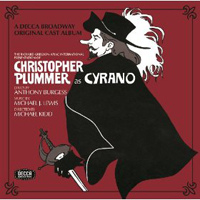 Original Broadway Cast, 1973 (A&M, 2LPs/Decca)
Original Broadway Cast, 1973 (A&M, 2LPs/Decca)  (4 / 5) This musical, based on Edmond Rostand’s Cyrano de Bergerac, boasts a wonderful translation and adaptation by Anthony Burgess, whose exquisitely poetic book and lyrics hew closely to his previously existing translation of the classic play. Also outstanding is the music of Michael J. Lewis — melodic, stirring, and well suited to the story, even if the orchestrations by Philip J. Lang fall short. Christopher Plummer gave one of his greatest performances as Cyrano, and though the quality of his singing voice is not great, it’s more than good enough for the type of songs Lewis and Burgess crafted for the character, which are far more dependent on acting ability than sheer vocal prowess. On the other hand, Leigh Beery as Roxana (as the character’s name is spelled in the musical) is an excellent singer; her performance of “You Have Made Me Love” is, in fact, one of the finest renditions of a musical theater ballad ever recorded. This gorgeous, relatively unknown song is a gem as worthy of fame as “Some Enchanted Evening,” for it’s just as romantic and stirring. The cast recording, mixed like a 1960s pop album, has a tinny sound quality and lacks vibrancy. But it does include much of the show’s dialogue, magnificently acted by Plummer, who justly won a Tony Award for his performance. One can only hope that Cyrano will someday be revived with an actor of Plummer’s caliber in the leading role. — Gerard Alessandrini
(4 / 5) This musical, based on Edmond Rostand’s Cyrano de Bergerac, boasts a wonderful translation and adaptation by Anthony Burgess, whose exquisitely poetic book and lyrics hew closely to his previously existing translation of the classic play. Also outstanding is the music of Michael J. Lewis — melodic, stirring, and well suited to the story, even if the orchestrations by Philip J. Lang fall short. Christopher Plummer gave one of his greatest performances as Cyrano, and though the quality of his singing voice is not great, it’s more than good enough for the type of songs Lewis and Burgess crafted for the character, which are far more dependent on acting ability than sheer vocal prowess. On the other hand, Leigh Beery as Roxana (as the character’s name is spelled in the musical) is an excellent singer; her performance of “You Have Made Me Love” is, in fact, one of the finest renditions of a musical theater ballad ever recorded. This gorgeous, relatively unknown song is a gem as worthy of fame as “Some Enchanted Evening,” for it’s just as romantic and stirring. The cast recording, mixed like a 1960s pop album, has a tinny sound quality and lacks vibrancy. But it does include much of the show’s dialogue, magnificently acted by Plummer, who justly won a Tony Award for his performance. One can only hope that Cyrano will someday be revived with an actor of Plummer’s caliber in the leading role. — Gerard Alessandrini
Cry for Us All
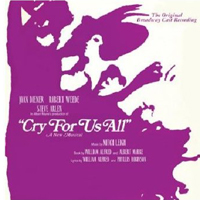 Original Broadway Cast, 1970 (Project 3)
Original Broadway Cast, 1970 (Project 3)  (3 / 5) This was composer Mitch Leigh’s follow-up to Man of La Mancha, and it was a long way from Spain to Brooklyn. The show was in trouble out of town — there was a temporary title change to Who to Love? — and it lasted only nine performances on Broadway. However, the score, with lyrics by William Alfred and Phyllis Robinson, often lives up to what this musical was trying to be: a semi-operatic version of Hogan’s Goat, William Alfred’s Pulitzer Prize-winning play about love and betrayal in the world of 1890s Brooklyn politics. Although the source material might have been better served by a completely sung-through approach, many of the songs are effective, and the performers handle them well. Joan Diener does a beautiful job with “Verandah Waltz,” “How Are Ya Since?” and “Who to Love?” There is strong legit singing from Steve Arlen in “The End of My Race” and Robert Weede in “The Mayor’s Chair.” Tommy Rall and Helen Gallagher do their best with some mediocre material, and the three urchins who narrate the story are entertaining in “The Broken Heart or the Wages of Sin” and “The Cruelty Man.” A few important songs are missing from this album, and others are heard in abridged form. The recording is available on CD as a rare, high-priced import. — Jeffrey Dunn
(3 / 5) This was composer Mitch Leigh’s follow-up to Man of La Mancha, and it was a long way from Spain to Brooklyn. The show was in trouble out of town — there was a temporary title change to Who to Love? — and it lasted only nine performances on Broadway. However, the score, with lyrics by William Alfred and Phyllis Robinson, often lives up to what this musical was trying to be: a semi-operatic version of Hogan’s Goat, William Alfred’s Pulitzer Prize-winning play about love and betrayal in the world of 1890s Brooklyn politics. Although the source material might have been better served by a completely sung-through approach, many of the songs are effective, and the performers handle them well. Joan Diener does a beautiful job with “Verandah Waltz,” “How Are Ya Since?” and “Who to Love?” There is strong legit singing from Steve Arlen in “The End of My Race” and Robert Weede in “The Mayor’s Chair.” Tommy Rall and Helen Gallagher do their best with some mediocre material, and the three urchins who narrate the story are entertaining in “The Broken Heart or the Wages of Sin” and “The Cruelty Man.” A few important songs are missing from this album, and others are heard in abridged form. The recording is available on CD as a rare, high-priced import. — Jeffrey Dunn
Crazy for You
 Original Broadway Cast, 1992 (Angel)
Original Broadway Cast, 1992 (Angel)  (2 / 5) This is a faux revival cloned from the DNA of a vintage musical, with a score drawn from the Gershwin songbook. Ken Ludwig’s book for Crazy for You is sort of based on the 1930 Gershwin hit Girl Crazy, transferring a standard, let’s-put-on-a-show plot to the Wild West. It’s hard to get very excited about the disc, which is really only a collection of Gershwin standards with a few rarities tossed in, but William D. Brohn’s orchestrations have real zing, and the cast is fun. As a New York millionaire who dreams of Broadway stardom and ends up putting on a show in Deadrock, Nevada, Harry Groener is a model of period style, tossing off “I Can’t Be Bothered Now” and “Nice Work If You Can Get It” with delightful ease. Jodi Benson plays his feisty cowgirl love interest with intensity, and her heartfelt vibrato is put to good use in “Someone to Watch Over Me” and “But Not for Me.” There are amusing contributions from Bruce Adler as a Yiddish-accented producer and Michele Pawk as Greener’s overbearing fiancée. The show’s heart is in its production numbers, such as “Slap That Bass” and “I Got Rhythm,” during which Brohn’s vivacious arrangements build to a state of ecstasy. It’s always more fun to hear a new score in a new show but, of its kind, Crazy for You is about as good as it gets. — David Barbour
(2 / 5) This is a faux revival cloned from the DNA of a vintage musical, with a score drawn from the Gershwin songbook. Ken Ludwig’s book for Crazy for You is sort of based on the 1930 Gershwin hit Girl Crazy, transferring a standard, let’s-put-on-a-show plot to the Wild West. It’s hard to get very excited about the disc, which is really only a collection of Gershwin standards with a few rarities tossed in, but William D. Brohn’s orchestrations have real zing, and the cast is fun. As a New York millionaire who dreams of Broadway stardom and ends up putting on a show in Deadrock, Nevada, Harry Groener is a model of period style, tossing off “I Can’t Be Bothered Now” and “Nice Work If You Can Get It” with delightful ease. Jodi Benson plays his feisty cowgirl love interest with intensity, and her heartfelt vibrato is put to good use in “Someone to Watch Over Me” and “But Not for Me.” There are amusing contributions from Bruce Adler as a Yiddish-accented producer and Michele Pawk as Greener’s overbearing fiancée. The show’s heart is in its production numbers, such as “Slap That Bass” and “I Got Rhythm,” during which Brohn’s vivacious arrangements build to a state of ecstasy. It’s always more fun to hear a new score in a new show but, of its kind, Crazy for You is about as good as it gets. — David Barbour
The Cradle Will Rock
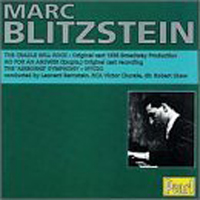 Original Broadway Cast, 1938 (Musicraft/Pearl)
Original Broadway Cast, 1938 (Musicraft/Pearl)  (3 / 5) The Cradle Will Rock, produced by John Houseman and directed by Orson Welles, was created under the auspices of the WPA’s Federal Theatre Project. What was to have been its opening performance at the Maxine Elliott Theatre was blocked by guards who were ordered to close down the controversial show. The company and audience then marched to the Venice Theatre on 59th Street, where the premiere took place with the actors performing from the house as composer-lyricist-librettist Marc Blitzstein played a lone piano on a bare stage. For two weeks, performances continued without sets and costumes and with solo piano accompaniment. When the show reopened six months later for a Broadway run, it was recorded; this may well be considered the first original Broadway cast album ever. It includes narration and accompaniment by composer/lyricist Marc Blitzstein, and the score sounds like no other. Heavily influenced by Brecht-Weill works, Blitzstein turned his classical training toward creating an agitprop piece about the Great Depression. It offers musical theater songs, protest songs, pastiche numbers, recitative — whatever would engender audience response to the unpleasant truths being revealed. The performances on this vivid recording are full of passion. Olive Stanton is vulnerable in the historic “Moll’s Song” and later grabs you with “Nickel Under the Foot.” As Larry Foreman, Howard Da Silva delivers a powerful “Leaflets,” leading into the title song with an effective mixture of humor and outrage. As Ella Hammer, Blanche Collins sings “Joe Worker” with appropriate defeat in her voice. Other highlights are “Honolulu” (a spoof of tropical songs), the satirical “Art for Art’s Sake,” and the sarcastic “The Freedom of the Press.” These recordings, documents of great historic value, are available on CD in the two-disc Pearl set Marc Blitzstein: Musical Theatre Premieres, which includes the 1941 cast album of No for an Answer (featuring a young Carol Channing) and The “Airborne” Symphony, conducted by Leonard Bernstein. — Jeffrey Dunn
(3 / 5) The Cradle Will Rock, produced by John Houseman and directed by Orson Welles, was created under the auspices of the WPA’s Federal Theatre Project. What was to have been its opening performance at the Maxine Elliott Theatre was blocked by guards who were ordered to close down the controversial show. The company and audience then marched to the Venice Theatre on 59th Street, where the premiere took place with the actors performing from the house as composer-lyricist-librettist Marc Blitzstein played a lone piano on a bare stage. For two weeks, performances continued without sets and costumes and with solo piano accompaniment. When the show reopened six months later for a Broadway run, it was recorded; this may well be considered the first original Broadway cast album ever. It includes narration and accompaniment by composer/lyricist Marc Blitzstein, and the score sounds like no other. Heavily influenced by Brecht-Weill works, Blitzstein turned his classical training toward creating an agitprop piece about the Great Depression. It offers musical theater songs, protest songs, pastiche numbers, recitative — whatever would engender audience response to the unpleasant truths being revealed. The performances on this vivid recording are full of passion. Olive Stanton is vulnerable in the historic “Moll’s Song” and later grabs you with “Nickel Under the Foot.” As Larry Foreman, Howard Da Silva delivers a powerful “Leaflets,” leading into the title song with an effective mixture of humor and outrage. As Ella Hammer, Blanche Collins sings “Joe Worker” with appropriate defeat in her voice. Other highlights are “Honolulu” (a spoof of tropical songs), the satirical “Art for Art’s Sake,” and the sarcastic “The Freedom of the Press.” These recordings, documents of great historic value, are available on CD in the two-disc Pearl set Marc Blitzstein: Musical Theatre Premieres, which includes the 1941 cast album of No for an Answer (featuring a young Carol Channing) and The “Airborne” Symphony, conducted by Leonard Bernstein. — Jeffrey Dunn
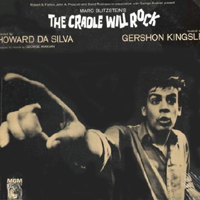 Off-Broadway Cast, 1964 (MGM, 2LPs/no CD)
Off-Broadway Cast, 1964 (MGM, 2LPs/no CD)  (3 / 5) Two notable aspects of this revival were its superb direction by Howard Da Silva and the contribution of Leonard Bernstein as musical consultant. Gershon Kingsley’s piano playing and musical direction are crisp and driving. Nancy Andrews, who dominates the first half as Mrs. Mister, rips into her material with gusto and great pipes. In the second half, Jerry Orbach as Larry Foreman sings with power and outrage, especially in the title song. Also impressive are Gordon B. Clarke, Joe Bova, and Rita Gardner. — J.D.
(3 / 5) Two notable aspects of this revival were its superb direction by Howard Da Silva and the contribution of Leonard Bernstein as musical consultant. Gershon Kingsley’s piano playing and musical direction are crisp and driving. Nancy Andrews, who dominates the first half as Mrs. Mister, rips into her material with gusto and great pipes. In the second half, Jerry Orbach as Larry Foreman sings with power and outrage, especially in the title song. Also impressive are Gordon B. Clarke, Joe Bova, and Rita Gardner. — J.D.
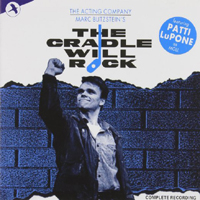 Original London Cast, 1985 (Polygram/JAY, 2CDs)
Original London Cast, 1985 (Polygram/JAY, 2CDs)  (3 / 5) This production reawakened interest in The Cradle Will Rock when The Acting Company presented it Off-Broadway, again directed by Howard Da Silva, and then took it to London. Each performance began with John Houseman recounting the saga of the show’s cancellation in 1937; that 12-minute prologue is recorded here. At the piano is musical director Michael Barrett, a Bernstein protégé. Randle Mell is a powerful Larry Foreman, and Michele-Denise Woods as Ella Hammer stops the show with “Joe Worker.” Patti LuPone’s rendition of Moll’s “Nickel Under the Foot” is one of her finest recorded performances, searingly honest and faultlessly nuanced. Other standouts are David Schramm, Casey Biggs, and Leslie Geraci. This is an often exciting, concise recording of the piece; the first disc of the set consists entirely of Houseman’s narration. It should be your first stop in getting acquainted with this groundbreaking musical. — J.D.
(3 / 5) This production reawakened interest in The Cradle Will Rock when The Acting Company presented it Off-Broadway, again directed by Howard Da Silva, and then took it to London. Each performance began with John Houseman recounting the saga of the show’s cancellation in 1937; that 12-minute prologue is recorded here. At the piano is musical director Michael Barrett, a Bernstein protégé. Randle Mell is a powerful Larry Foreman, and Michele-Denise Woods as Ella Hammer stops the show with “Joe Worker.” Patti LuPone’s rendition of Moll’s “Nickel Under the Foot” is one of her finest recorded performances, searingly honest and faultlessly nuanced. Other standouts are David Schramm, Casey Biggs, and Leslie Geraci. This is an often exciting, concise recording of the piece; the first disc of the set consists entirely of Houseman’s narration. It should be your first stop in getting acquainted with this groundbreaking musical. — J.D.
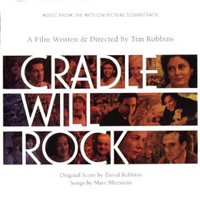 Film Soundtrack, 1999 (RCA)
Film Soundtrack, 1999 (RCA)  (1 / 5) Tim Robbins’ film Cradle Will Rock (no “The”) tells the story of the original production intermingled with other plots concerning art and censorship. About half of this CD is devoted to songs from the original show; the other half is new music composed for the film by David Robbins. “Moll’s Song” (sung by Emily Watson), “Croon Spoon” (Eddie Vetter and Susan Sarandon), “Honolulu” (Erin Hill, Dan Jenkins, Vicki Clark, Tim Jerome), “Reverend Salvation” (Vicki Clark and Chris McKinney), “The Freedom of the Press” (Henry Stram and Tim Jerome), and “Art for Art’s Sake” are all here in unedited form, plus Audra McDonald’s compelling rendition of “Joe Worker.” (Other songs in the film are not on the CD.) In the notes for the recording, David Robbins writes: “The arrangements you hear are, for the most part, Blitzstein’s original orchestrations.” This may be technically true, but because the orchestra here consists of only 12 instruments with a single violin, the score has more of a Brecht-Weill sound than the operatic heft that Blitzstein intended. The disc begins with an awful rendition of “Nickel Under the Foot,” heard in the film over the end titles, but don’t let this one disgraceful track keep you from exploring the pleasures of the recording. — J.D.
(1 / 5) Tim Robbins’ film Cradle Will Rock (no “The”) tells the story of the original production intermingled with other plots concerning art and censorship. About half of this CD is devoted to songs from the original show; the other half is new music composed for the film by David Robbins. “Moll’s Song” (sung by Emily Watson), “Croon Spoon” (Eddie Vetter and Susan Sarandon), “Honolulu” (Erin Hill, Dan Jenkins, Vicki Clark, Tim Jerome), “Reverend Salvation” (Vicki Clark and Chris McKinney), “The Freedom of the Press” (Henry Stram and Tim Jerome), and “Art for Art’s Sake” are all here in unedited form, plus Audra McDonald’s compelling rendition of “Joe Worker.” (Other songs in the film are not on the CD.) In the notes for the recording, David Robbins writes: “The arrangements you hear are, for the most part, Blitzstein’s original orchestrations.” This may be technically true, but because the orchestra here consists of only 12 instruments with a single violin, the score has more of a Brecht-Weill sound than the operatic heft that Blitzstein intended. The disc begins with an awful rendition of “Nickel Under the Foot,” heard in the film over the end titles, but don’t let this one disgraceful track keep you from exploring the pleasures of the recording. — J.D.
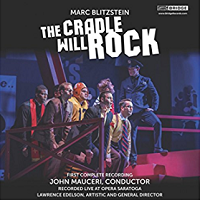 Live Performance at Opera Saratoga, 2018 (Bridge)
Live Performance at Opera Saratoga, 2018 (Bridge)  (4 / 5) This is the first and, to date, only complete recording of the full score of The Cradle Will Rock with the original 1937 orchestrations by Blitzstein restored, and it’s a revelation in that regard. Overall, the orchestrations are fuller, more melodic, less “spikey” than one might expect, giving credence to Jeffrey Dunn’s comment (as stated above) that Blitzstein was going for more of an operatic sound rather than a minimalist, Brecht/Weill flavor with this work. Of course, that grand operatic heft is heightened here by the casting of singers with “legit” voices, and also by the fact that the excellent live recording exhibits a fair amount of natural reverb. The cast is strong, led by Christopher Burchett as Larry Foreman, Ginger Costa-Jackson as Moll, Matt Boehler as Mr. Mister, Audrey Babcock as Mrs. Mister, and Justin Hopkins as Reverend Salvation. Conductor John Mauceri leads a crackling, energetic performance that seems geared more towards entertaining the audience than “alienating” us in the Brecht/Weill fashion. — Michael Portantiere
(4 / 5) This is the first and, to date, only complete recording of the full score of The Cradle Will Rock with the original 1937 orchestrations by Blitzstein restored, and it’s a revelation in that regard. Overall, the orchestrations are fuller, more melodic, less “spikey” than one might expect, giving credence to Jeffrey Dunn’s comment (as stated above) that Blitzstein was going for more of an operatic sound rather than a minimalist, Brecht/Weill flavor with this work. Of course, that grand operatic heft is heightened here by the casting of singers with “legit” voices, and also by the fact that the excellent live recording exhibits a fair amount of natural reverb. The cast is strong, led by Christopher Burchett as Larry Foreman, Ginger Costa-Jackson as Moll, Matt Boehler as Mr. Mister, Audrey Babcock as Mrs. Mister, and Justin Hopkins as Reverend Salvation. Conductor John Mauceri leads a crackling, energetic performance that seems geared more towards entertaining the audience than “alienating” us in the Brecht/Weill fashion. — Michael Portantiere
A Connecticut Yankee
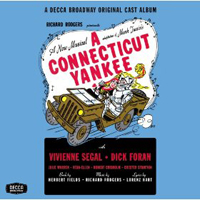 Broadway Cast, 1943 (Decca)
Broadway Cast, 1943 (Decca)  (4 / 5) This Richard Rodgers and Lorenz Hart treasure was belatedly transferred to CD and is now available in beautifully restored, remarkably clear sound. The wonderful 1927 show benefits greatly from the new songs written by the team for this 1943 revival to augment the original score. Included here are some of the last lyrics ever penned by Hart, who died shortly after the revival opened. Among the numbers retained from the original production are the standards “My Heart Stood Still” and “Thou Swell,” charmingly performed by Dick Foran and Julie Warren. It’s fun to hear the actual singing voice of Vera-Ellen, who was always dubbed in Hollywood films; her quirky sound is ideal for this soubrette role. “On a Desert Island With Thee” and “I Feel At Home With You,” her duets with Chester Stratton as the stalwart Sir Galahad, are punchy and humorous. Furthermore, this recording offers Vivienne Segal as Morgan Le Fey, a role that was beefed up for the revival. Her extended version of “To Keep My Love Alive,” one of the new songs, makes it clear why Segal was an acclaimed leading lady of her era. The two other “new for the revival” songs are Segal’s “Can’t You Do a Friend a Favor?” (a duet with Foran) and “You Always Love the Same Girl” (a lusty duet sung by Foran and Robert Chisholm as King Arthur). This CD also includes “It Never Entered My Mind” and three other songs from Rodgers and Hart’s Higher and Higher, performed by Shirley Ross. As if that weren’t enough, The Incomparable Hildegarde’s recordings of four songs from By Jupiter were added, making this revival CD an indispensable Rodgers and Hart compendium. That said, it’s regrettable that Decca chose not to record the one other notable new number written for the 1943 revival of Connecticut Yankee, Segal’s “This Is My Night to Howl.” — Jeffrey Dunn
(4 / 5) This Richard Rodgers and Lorenz Hart treasure was belatedly transferred to CD and is now available in beautifully restored, remarkably clear sound. The wonderful 1927 show benefits greatly from the new songs written by the team for this 1943 revival to augment the original score. Included here are some of the last lyrics ever penned by Hart, who died shortly after the revival opened. Among the numbers retained from the original production are the standards “My Heart Stood Still” and “Thou Swell,” charmingly performed by Dick Foran and Julie Warren. It’s fun to hear the actual singing voice of Vera-Ellen, who was always dubbed in Hollywood films; her quirky sound is ideal for this soubrette role. “On a Desert Island With Thee” and “I Feel At Home With You,” her duets with Chester Stratton as the stalwart Sir Galahad, are punchy and humorous. Furthermore, this recording offers Vivienne Segal as Morgan Le Fey, a role that was beefed up for the revival. Her extended version of “To Keep My Love Alive,” one of the new songs, makes it clear why Segal was an acclaimed leading lady of her era. The two other “new for the revival” songs are Segal’s “Can’t You Do a Friend a Favor?” (a duet with Foran) and “You Always Love the Same Girl” (a lusty duet sung by Foran and Robert Chisholm as King Arthur). This CD also includes “It Never Entered My Mind” and three other songs from Rodgers and Hart’s Higher and Higher, performed by Shirley Ross. As if that weren’t enough, The Incomparable Hildegarde’s recordings of four songs from By Jupiter were added, making this revival CD an indispensable Rodgers and Hart compendium. That said, it’s regrettable that Decca chose not to record the one other notable new number written for the 1943 revival of Connecticut Yankee, Segal’s “This Is My Night to Howl.” — Jeffrey Dunn
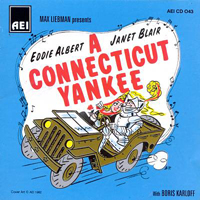 Television Soundtrack, 1955 (AEI)
Television Soundtrack, 1955 (AEI)  (1 / 5) This version of A Connecticut Yankee was one of a series of 1950s television presentations of Broadway musicals. Based on the 1943 Broadway revival, the TV book was adapted by William Friedberg, Neil Simon, Will Glickman, and Al Schwartz. Included are several songs written for the revival, such as the elusive “This Is My Night to Howl” and “Ye Lunchtime Follies.” The sound quality of the recording is rather poor, but leads Eddie Albert and Janet Blair sing well, although “My Heart Stood Still” is painfully slow. The tempo is also off for the comedy song “On a Desert Island With Thee,” which seems to have been mistaken for a ballad. Several choruses of “To Keep My Love Alive” have been cut but are not missed, given Gale Sherwood’s humorless performance. On the other hand, this album provides a rare opportunity to hear Boris Karloff singing (not very well) as he joins Albert in “You Always Love the Same Girl.” There is a bonus track of “My Heart Stood Still” as performed in the British revue One Dam Thing After Another by Jessie Matthews. — J.D.
(1 / 5) This version of A Connecticut Yankee was one of a series of 1950s television presentations of Broadway musicals. Based on the 1943 Broadway revival, the TV book was adapted by William Friedberg, Neil Simon, Will Glickman, and Al Schwartz. Included are several songs written for the revival, such as the elusive “This Is My Night to Howl” and “Ye Lunchtime Follies.” The sound quality of the recording is rather poor, but leads Eddie Albert and Janet Blair sing well, although “My Heart Stood Still” is painfully slow. The tempo is also off for the comedy song “On a Desert Island With Thee,” which seems to have been mistaken for a ballad. Several choruses of “To Keep My Love Alive” have been cut but are not missed, given Gale Sherwood’s humorless performance. On the other hand, this album provides a rare opportunity to hear Boris Karloff singing (not very well) as he joins Albert in “You Always Love the Same Girl.” There is a bonus track of “My Heart Stood Still” as performed in the British revue One Dam Thing After Another by Jessie Matthews. — J.D.
Company
 Original Broadway Cast, 1970 (Columbia/Sony)
Original Broadway Cast, 1970 (Columbia/Sony)  (5 / 5) A shocking musical when it first opened, and still an insightful if somewhat dyspeptic view of modern romantic relationships, Company explores the games, angst, loneliness, and badinage of love and marriage in an alternately brittle and heartfelt manner. In a sense, it’s a revuesical — a string of nonlinear scenes built around a single theme. When it first burst onto Broadway, the show was revolutionary: no chorus, no legs (save Donna McKechnie’s in the dance number “Tick Tock”), no salve for the tired businessman. Instead, it boasted one of Stephen Sondheim’s most brilliant scores, Jonathan Tunick’s ingeniously metallic orchestrations, Boris Aronson’s architectural sets, George Furth’s sharp book, and Hal Prince’s sparse, savvy staging. The original cast album, produced by Thomas Z. Shepard, is a marvel of clean, no-nonsense theatricality, an exemplary souvenir of a momentous turn in the history of musical theater. (Company unfortunately led to numerous second-rate imitations by Sondheim wannabes.) The highlight of the recording is “The Ladies Who Lunch,” exclaimed by Elaine Stritch in career-capping fashion. Other standouts in the cast are Pamela Myers, Beth Howland, and Teri Ralston. The album preserves the performances of central character Bobby’s songs by Dean Jones, who left the cast shortly after the show’s opening. Larry Kert took over for Jones, and his wonderful renditions can be heard on the “Original London Cast” recording of Company. Since that cast was pretty much identical to the Broadway cast, sans Jones, all the label did was take out his vocals and slap in Kert’s. If you can find the album, listen closely and you’ll hear ghosts of Jones’ voice in the background. Spooky! — Ken Bloom
(5 / 5) A shocking musical when it first opened, and still an insightful if somewhat dyspeptic view of modern romantic relationships, Company explores the games, angst, loneliness, and badinage of love and marriage in an alternately brittle and heartfelt manner. In a sense, it’s a revuesical — a string of nonlinear scenes built around a single theme. When it first burst onto Broadway, the show was revolutionary: no chorus, no legs (save Donna McKechnie’s in the dance number “Tick Tock”), no salve for the tired businessman. Instead, it boasted one of Stephen Sondheim’s most brilliant scores, Jonathan Tunick’s ingeniously metallic orchestrations, Boris Aronson’s architectural sets, George Furth’s sharp book, and Hal Prince’s sparse, savvy staging. The original cast album, produced by Thomas Z. Shepard, is a marvel of clean, no-nonsense theatricality, an exemplary souvenir of a momentous turn in the history of musical theater. (Company unfortunately led to numerous second-rate imitations by Sondheim wannabes.) The highlight of the recording is “The Ladies Who Lunch,” exclaimed by Elaine Stritch in career-capping fashion. Other standouts in the cast are Pamela Myers, Beth Howland, and Teri Ralston. The album preserves the performances of central character Bobby’s songs by Dean Jones, who left the cast shortly after the show’s opening. Larry Kert took over for Jones, and his wonderful renditions can be heard on the “Original London Cast” recording of Company. Since that cast was pretty much identical to the Broadway cast, sans Jones, all the label did was take out his vocals and slap in Kert’s. If you can find the album, listen closely and you’ll hear ghosts of Jones’ voice in the background. Spooky! — Ken Bloom
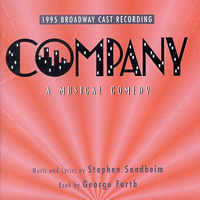 Broadway Cast, 1995 (Angel)
Broadway Cast, 1995 (Angel)  (2 / 5) The cast members here are not up to their counterparts in the company of the original production. Somehow, the performances aren’t as cynical or pointed, and that definitely includes Boyd Gaines as Bobby. Debra Monk is an exception: She isn’t quite as hard-bitten a Joanne as Elaine Stritch, but she comes close. Others in the cast who were notable names at the time and/or became so in future include Danny Burstein, Kate Burton, Diana Canova, Veanne Cox, Charlotte d’Amboise, John Hillner, Jane Krakowski, and LaChanze. Company is a hard show to revive because it was so much of its time, and we’re still close enough to that era to know when a production doesn’t capture the right flavor. That’s the major flaw of this recording. — K.B.
(2 / 5) The cast members here are not up to their counterparts in the company of the original production. Somehow, the performances aren’t as cynical or pointed, and that definitely includes Boyd Gaines as Bobby. Debra Monk is an exception: She isn’t quite as hard-bitten a Joanne as Elaine Stritch, but she comes close. Others in the cast who were notable names at the time and/or became so in future include Danny Burstein, Kate Burton, Diana Canova, Veanne Cox, Charlotte d’Amboise, John Hillner, Jane Krakowski, and LaChanze. Company is a hard show to revive because it was so much of its time, and we’re still close enough to that era to know when a production doesn’t capture the right flavor. That’s the major flaw of this recording. — K.B.
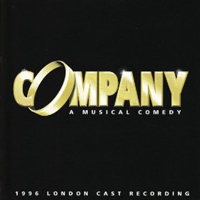 London Cast, 1996 (RCA)
London Cast, 1996 (RCA)  (2 / 5) Face it: Americans don’t do Shakespeare all that well, and the English can’t get American musical theater quite right. They’re fine with falling chandeliers and helicopters, but less well versed in U.S. attitudes, accents, and performance style. This Company is rather subdued, and none of the cast members sound really comfortable in their roles; they all seem too concerned with impersonating Americans rather than inhabiting their characters. Although Bobby is the focal point of the show, he is not the most interesting character — but at the end, he’s got the bang-up number “Being Alive,” in which he has to be really honest with himself and the audience. Adrian Lester just doesn’t make it; he’s more of a cipher who substitutes technique for honest emotion at his big moment. — K.B.
(2 / 5) Face it: Americans don’t do Shakespeare all that well, and the English can’t get American musical theater quite right. They’re fine with falling chandeliers and helicopters, but less well versed in U.S. attitudes, accents, and performance style. This Company is rather subdued, and none of the cast members sound really comfortable in their roles; they all seem too concerned with impersonating Americans rather than inhabiting their characters. Although Bobby is the focal point of the show, he is not the most interesting character — but at the end, he’s got the bang-up number “Being Alive,” in which he has to be really honest with himself and the audience. Adrian Lester just doesn’t make it; he’s more of a cipher who substitutes technique for honest emotion at his big moment. — K.B.
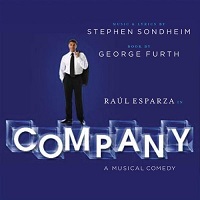 Broadway Cast, 2006 (Nonesuch)
Broadway Cast, 2006 (Nonesuch)  (4 / 5) The inclusion of so much spoken dialogue on this recording allows the listener to appreciate a brilliant acting choice made by Raúl Esparza in the role of Robert. When speaking, he affects the studied cool of a stereotypical, rather jaded New Yorker, but when he sings, Esparza brings forth all of the emotions lying beneath the surface, culminating in a searingly intense, cathartic performance of “Being Alive.” Standouts among the rest of the cast are Elizabeth Stanley’s April as heard in “Barcelona” and Heather Laws’ Amy as heard in “Getting Married Today,” while Barbara Walsh gives a smart account of “The Ladies Who Lunch,” a song that will always be irrevocably associated with Elaine Stritch. The recording features new orchestrations by Mary-Mitchell Campbell; they were played by the actors themselves in this sleek, minimalist production directed by John Doyle, who had previously set forth the same actors-doubling-as-musicians concept in the 2005 Broadway revival of Sondheim’s Sweeney Todd. To this listener’s ears, Campbell’s work here is stellar, and indeed, she won a Drama Desk award for her efforts. [Note: This Company opened on Broadway on November 29, 2006, but the cast album was released in 2007.] — Michael Portantiere
(4 / 5) The inclusion of so much spoken dialogue on this recording allows the listener to appreciate a brilliant acting choice made by Raúl Esparza in the role of Robert. When speaking, he affects the studied cool of a stereotypical, rather jaded New Yorker, but when he sings, Esparza brings forth all of the emotions lying beneath the surface, culminating in a searingly intense, cathartic performance of “Being Alive.” Standouts among the rest of the cast are Elizabeth Stanley’s April as heard in “Barcelona” and Heather Laws’ Amy as heard in “Getting Married Today,” while Barbara Walsh gives a smart account of “The Ladies Who Lunch,” a song that will always be irrevocably associated with Elaine Stritch. The recording features new orchestrations by Mary-Mitchell Campbell; they were played by the actors themselves in this sleek, minimalist production directed by John Doyle, who had previously set forth the same actors-doubling-as-musicians concept in the 2005 Broadway revival of Sondheim’s Sweeney Todd. To this listener’s ears, Campbell’s work here is stellar, and indeed, she won a Drama Desk award for her efforts. [Note: This Company opened on Broadway on November 29, 2006, but the cast album was released in 2007.] — Michael Portantiere
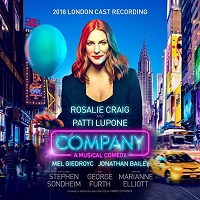 London Cast, 2019 (Arts Music)
London Cast, 2019 (Arts Music)  (2 / 5) One’s reaction to this recording will depend largely on how one feels about the concept of the production it represents, a radical revisal of the musical that opened on Broadway in 1970. Whereas Company as originally written was set at the time of the show’s premiere and told the story of a 35-year-old, single, male New Yorker and his relationships with five married couples and three of his girlfriends, here the time period has been shifted to the present (i.e., circa 2019), and the central character is now a woman called Bobbie. The genders of the girlfriends have also been switched, so they are now boyfriends, and the couple that endures all that pre-wedding drama in “Getting Married Today” is now a gay male couple. Though this version of Company received many favorable notices in London, some critics (and audiences) felt that the retrofitting of the show did not work at all, either in terms of the sex changes or the updating of the action. Some of Stephen Sondheim’s rewrites of lyrics he wrote 50 years ago are clever, but others may displease fans of the originals; many of the changes were made to accommodate the gender switches, some for other reasons. The re-conception of “You Could Drive a Person Crazy” is a total misfire, and there are several egregious revisions of various lyrics in other songs. (“Poor Baby” includes one of the worst examples: “Robert ought to have a woman” is now “Bobbie ought to have a fella.”) In the midst of all this, Rosalie Craig brings a lovely voice and charming personality to Bobbie’s songs on the cast album. American musical theater superstar Patti LuPone reprises the gender-maintained role of Joanne, miscast as she was when she first essayed the part in the New York Philharmonic’s 2011 staged concert performances of Company. The rest of the cast varies in terms of singing ability and their facility at American accents; if there weren’t some references to the fact, you probably wouldn’t guess that this show is supposed to be set in New York City. The orchestrations are not as full as the originals, but quite alright in themselves. [Note: This production later transferred to Broadway, with an entirely different cast other than Patti LuPone, and managed an eight-month run there but did not yield another cast album.] — M.P.
(2 / 5) One’s reaction to this recording will depend largely on how one feels about the concept of the production it represents, a radical revisal of the musical that opened on Broadway in 1970. Whereas Company as originally written was set at the time of the show’s premiere and told the story of a 35-year-old, single, male New Yorker and his relationships with five married couples and three of his girlfriends, here the time period has been shifted to the present (i.e., circa 2019), and the central character is now a woman called Bobbie. The genders of the girlfriends have also been switched, so they are now boyfriends, and the couple that endures all that pre-wedding drama in “Getting Married Today” is now a gay male couple. Though this version of Company received many favorable notices in London, some critics (and audiences) felt that the retrofitting of the show did not work at all, either in terms of the sex changes or the updating of the action. Some of Stephen Sondheim’s rewrites of lyrics he wrote 50 years ago are clever, but others may displease fans of the originals; many of the changes were made to accommodate the gender switches, some for other reasons. The re-conception of “You Could Drive a Person Crazy” is a total misfire, and there are several egregious revisions of various lyrics in other songs. (“Poor Baby” includes one of the worst examples: “Robert ought to have a woman” is now “Bobbie ought to have a fella.”) In the midst of all this, Rosalie Craig brings a lovely voice and charming personality to Bobbie’s songs on the cast album. American musical theater superstar Patti LuPone reprises the gender-maintained role of Joanne, miscast as she was when she first essayed the part in the New York Philharmonic’s 2011 staged concert performances of Company. The rest of the cast varies in terms of singing ability and their facility at American accents; if there weren’t some references to the fact, you probably wouldn’t guess that this show is supposed to be set in New York City. The orchestrations are not as full as the originals, but quite alright in themselves. [Note: This production later transferred to Broadway, with an entirely different cast other than Patti LuPone, and managed an eight-month run there but did not yield another cast album.] — M.P.
Coco
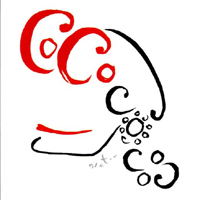 Original Broadway Cast, 1969 (ABC-Paramount/MCA)
Original Broadway Cast, 1969 (ABC-Paramount/MCA)  (1 / 5) It’s terrible, fascinating, and possibly the most unreviewable of all cast recordings. Alan Jay Lerner cooked up this musical bio of Coco Chanel and somehow got Katharine Hepburn to star. The result is a camp hoot as viewed from many different angles. Hepburn’s singing makes Lauren Bacall sound like Joan Sutherland; she ends up in a statistical dead heat with Bette Davis for the title of least vocally qualified star in Broadway musical history. Just listen to her gamely navigate Lerner’s tongue-twisting lyrics (“Should I drive myself to drink / For some ruffians who think / That chic is someone riding on a camel?”) while a drumbeat struggles to keep her in some kind of rhythm. Furthermore, the show is a museum of dated social attitudes: Lerner constantly raps Chanel on the knuckles for putting a career before love, and much of the action focuses on Coco’s pathetic attraction to a young model, Noelle, whom she views as a surrogate daughter. (As Noelle’s boyfriend points out, “To me this emporium / Is sex in memoriam / Where feelings are frozen / And face lotion flows in your veins.”) On top of all that, Chanel’s nemesis is Sebastian (René Auberjonois), a screaming queen of a dress designer described in the original liner notes as “almost male, almost female, almost human.” His number “Fiasco,” in which he hyperventilates in triumph over Coco’s flop showing, is best described as grisly. And yet, André Previn’s music is jazzy, impudent, and often gorgeously romantic in the style of his years at MGM; Lerner’s lyrics have much of his old urbanity; and Hepburn’s star power burns through everything. You’ve got to hear this album once, even if you never want to hear it again. — David Barbour
(1 / 5) It’s terrible, fascinating, and possibly the most unreviewable of all cast recordings. Alan Jay Lerner cooked up this musical bio of Coco Chanel and somehow got Katharine Hepburn to star. The result is a camp hoot as viewed from many different angles. Hepburn’s singing makes Lauren Bacall sound like Joan Sutherland; she ends up in a statistical dead heat with Bette Davis for the title of least vocally qualified star in Broadway musical history. Just listen to her gamely navigate Lerner’s tongue-twisting lyrics (“Should I drive myself to drink / For some ruffians who think / That chic is someone riding on a camel?”) while a drumbeat struggles to keep her in some kind of rhythm. Furthermore, the show is a museum of dated social attitudes: Lerner constantly raps Chanel on the knuckles for putting a career before love, and much of the action focuses on Coco’s pathetic attraction to a young model, Noelle, whom she views as a surrogate daughter. (As Noelle’s boyfriend points out, “To me this emporium / Is sex in memoriam / Where feelings are frozen / And face lotion flows in your veins.”) On top of all that, Chanel’s nemesis is Sebastian (René Auberjonois), a screaming queen of a dress designer described in the original liner notes as “almost male, almost female, almost human.” His number “Fiasco,” in which he hyperventilates in triumph over Coco’s flop showing, is best described as grisly. And yet, André Previn’s music is jazzy, impudent, and often gorgeously romantic in the style of his years at MGM; Lerner’s lyrics have much of his old urbanity; and Hepburn’s star power burns through everything. You’ve got to hear this album once, even if you never want to hear it again. — David Barbour
Closer Than Ever
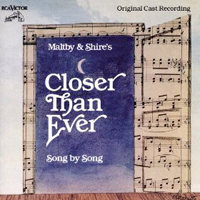 Original Off-Broadway Cast, 1989 (RCA, 2CDs)
Original Off-Broadway Cast, 1989 (RCA, 2CDs)  (4 / 5) To one set of critics, this four-person revue of songs by composer David Shire and lyricist Richard Maltby, Jr. was a long-overdue outpouring of material from a gifted, underappreciated team; to another, it was largely an evening of self-involved, spoiled yuppies whining in song. Both viewpoints are correct. The two dozen numbers on this double-CD set, representing the entire show, are impeccably crafted, with music and lyrics that are melodic, intelligent, humorous, and reflective. But many of the characters that sing them are unappealing: well-off, urban thirtysomethings yammering yards of pentameter about health crazes, Muzak, and personal discovery. So while there’s some first-rate stuff here — “Miss Byrd,” “One of the Good Guys,” “The Bear, the Tiger, the Hamster, and the Mole,” each the equivalent of a self-contained, one-act play — there are also such odes to emotional self-indulgence as “Next Time,” “I Wouldn’t Go Back,” and “Like a Baby.” Uneven as the musical program is, there’s a saving grace in that this is one of the best-sung cast albums of the ’80s. Brent Barrett, at the peak of his powers, puts over even the second-tier songs with assurance and thrilling high notes. Sally Mayes’ natural warmth and comedic skill shine in “You Want to Be My Friend?” and “Back on Base.” The prodigiously talented Lynne Wintersteller’s “Life Story” is one of the most affecting show-tune tracks of the ’80s. Even Richard Muenz, normally a ham, keeps his preening in check until the heavy-breathing “If I Sing.” The cast is also splendid collectively — hear how gorgeously they harmonize in “She Loves Me Not” — and the album’s arrangements, augmented from the stage production to include a swinging combo, lend color. Closer Than Ever may have lacked the sense of discovery that marked the earlier Maltby-Shire revue Starting Here, Starting Now, but as a recording, it’s consistently better sung. — Marc Miller
(4 / 5) To one set of critics, this four-person revue of songs by composer David Shire and lyricist Richard Maltby, Jr. was a long-overdue outpouring of material from a gifted, underappreciated team; to another, it was largely an evening of self-involved, spoiled yuppies whining in song. Both viewpoints are correct. The two dozen numbers on this double-CD set, representing the entire show, are impeccably crafted, with music and lyrics that are melodic, intelligent, humorous, and reflective. But many of the characters that sing them are unappealing: well-off, urban thirtysomethings yammering yards of pentameter about health crazes, Muzak, and personal discovery. So while there’s some first-rate stuff here — “Miss Byrd,” “One of the Good Guys,” “The Bear, the Tiger, the Hamster, and the Mole,” each the equivalent of a self-contained, one-act play — there are also such odes to emotional self-indulgence as “Next Time,” “I Wouldn’t Go Back,” and “Like a Baby.” Uneven as the musical program is, there’s a saving grace in that this is one of the best-sung cast albums of the ’80s. Brent Barrett, at the peak of his powers, puts over even the second-tier songs with assurance and thrilling high notes. Sally Mayes’ natural warmth and comedic skill shine in “You Want to Be My Friend?” and “Back on Base.” The prodigiously talented Lynne Wintersteller’s “Life Story” is one of the most affecting show-tune tracks of the ’80s. Even Richard Muenz, normally a ham, keeps his preening in check until the heavy-breathing “If I Sing.” The cast is also splendid collectively — hear how gorgeously they harmonize in “She Loves Me Not” — and the album’s arrangements, augmented from the stage production to include a swinging combo, lend color. Closer Than Ever may have lacked the sense of discovery that marked the earlier Maltby-Shire revue Starting Here, Starting Now, but as a recording, it’s consistently better sung. — Marc Miller
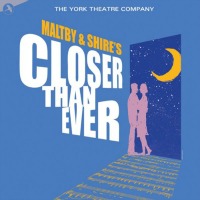 Off-Broadway Cast, 2012 (JAY, 2CDs)
Off-Broadway Cast, 2012 (JAY, 2CDs)  (4 / 5) The York Theatre Company revived Closer Than Ever in 2012, and the run of the show kept being extended, a hopeful sign that some theatergoers still have taste. The four vocalists — Jenn Colella, George Dvorsky, Christiane Noll, and Sal Viviano — are accomplished pros all, and Colella in particular pours a lot of feeling into everything she sings. But you may miss Lynne Wintersteller’s elegance and Brent Barrett’s high notes, and you’ll probably miss the other version’s orchestrations, here reduced to piano, bass, and drums. On the bonus side, we get two new Maltby-Shire songs. “There Is Something in a Wedding” feels schmaltzy coming from this duo, but “Dating Again,” the plaint of middle-aged singles diving back into the dating pool, is wry and wonderful. I’d go with the 1989 album if I could have only one, but there’s plenty of pleasure here as well. And the best of the songs hold up beautifully, with lyrics discreetly updated in spots. –– M.M.
(4 / 5) The York Theatre Company revived Closer Than Ever in 2012, and the run of the show kept being extended, a hopeful sign that some theatergoers still have taste. The four vocalists — Jenn Colella, George Dvorsky, Christiane Noll, and Sal Viviano — are accomplished pros all, and Colella in particular pours a lot of feeling into everything she sings. But you may miss Lynne Wintersteller’s elegance and Brent Barrett’s high notes, and you’ll probably miss the other version’s orchestrations, here reduced to piano, bass, and drums. On the bonus side, we get two new Maltby-Shire songs. “There Is Something in a Wedding” feels schmaltzy coming from this duo, but “Dating Again,” the plaint of middle-aged singles diving back into the dating pool, is wry and wonderful. I’d go with the 1989 album if I could have only one, but there’s plenty of pleasure here as well. And the best of the songs hold up beautifully, with lyrics discreetly updated in spots. –– M.M.
.
Cinderella (Rodgers & Hammerstein)
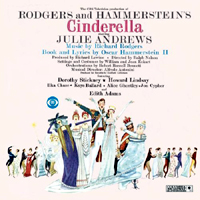 Original Television Cast, 1957 (Columbia)
Original Television Cast, 1957 (Columbia)  (5 / 5) In the age of television’s big-cast, major-hoopla “spectaculars,” one program stood out as a truly gala event: Rodgers and Harnmerstein’s Cinderella, starring Julie Andrews. Forget the Fairy Godmother; here, the magic was in the score and the star. Broadcast on March 31, 1957, Cinderella still stands as one of the most-watched programs in television history. Those were the days of live TV (the show survives in a kinescope, later released to home video) and of quick turnover for cast albums; this LP was actually in stores six days prior to the telecast! R&H’s Cinderella may not be their greatest achievement, but the team produced a fine score that is romantic and funny by turns, and the album is wonderful. Naturally, Andrews dominates. Wistful when singing “In My Own Little Corner,” rapturous in “A Lovely Night,” this great star is utterly believable as a fairy tale heroine. Nearly everyone else in the cast is up to her level, with only Jon Cypher as the Prince seeming a tad out of his league. Kaye Ballard and Alice Ghostley are very funny as the stepsisters — not hateful, just buffoonish in an endearing way. Dorothy Stickney and Howard Lindsay are sweet as the King and Queen, and Edith (Edie) Adams is a Fairy Godmother almost as young and charming as her cinder-smudged charge. Listening to this souvenir of a long-vanished era of TV entertainment, you think: “It really hasn’t gotten better, has it?” — Richard Barrios
(5 / 5) In the age of television’s big-cast, major-hoopla “spectaculars,” one program stood out as a truly gala event: Rodgers and Harnmerstein’s Cinderella, starring Julie Andrews. Forget the Fairy Godmother; here, the magic was in the score and the star. Broadcast on March 31, 1957, Cinderella still stands as one of the most-watched programs in television history. Those were the days of live TV (the show survives in a kinescope, later released to home video) and of quick turnover for cast albums; this LP was actually in stores six days prior to the telecast! R&H’s Cinderella may not be their greatest achievement, but the team produced a fine score that is romantic and funny by turns, and the album is wonderful. Naturally, Andrews dominates. Wistful when singing “In My Own Little Corner,” rapturous in “A Lovely Night,” this great star is utterly believable as a fairy tale heroine. Nearly everyone else in the cast is up to her level, with only Jon Cypher as the Prince seeming a tad out of his league. Kaye Ballard and Alice Ghostley are very funny as the stepsisters — not hateful, just buffoonish in an endearing way. Dorothy Stickney and Howard Lindsay are sweet as the King and Queen, and Edith (Edie) Adams is a Fairy Godmother almost as young and charming as her cinder-smudged charge. Listening to this souvenir of a long-vanished era of TV entertainment, you think: “It really hasn’t gotten better, has it?” — Richard Barrios
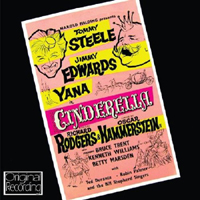 Original London Cast, 1958 (Decca/Bayview)
Original London Cast, 1958 (Decca/Bayview)  (2 / 5) Although it was written for television, Cinderella soon found its way onto the stage in productions that were usually fleshed-out with additional material, as in this recording. Rodgers and Hammerstein normally kept close tabs on major foreign productions of their work, but in this exceptional case, the property was sold outright for a Christmas pantomime at the London Palladium. A beloved British tradition, the “panto” format was pretty much set in stone — a star comedian, special music-hall material, comic drag — and all shows had to conform. Oddly enough, a version of the Cinderella story had been presented at the Palladium some years earlier, with the title role played by –Julie Andrews. (That was before she became famous as Eliza Doolittle in My Fair Lady.) But here, the star was the young Tommy Steele in a role that R&H never dreamed of: Buttons, a servant with a thick Cockney accent. The added songs are English-music-hall pop. While all of these changes diminish the heroine’s role, Cinderella still fares pretty well as performed by Yana, a British pop singer and TV personality of the time. As the prince, Bruce Trent is given an additional R&H gem, “No Other Love” — a song from the Broadway show Me and Juliet, with a melody Rodgers originally composed for Victory at Sea, a TV documentary about naval combat during World War II! There are other changes here and there but, fortunately, the drag stepsisters are not as campy as might have been feared. All in all, the recording is a curiosity at least, and sometimes more. — R.B.
(2 / 5) Although it was written for television, Cinderella soon found its way onto the stage in productions that were usually fleshed-out with additional material, as in this recording. Rodgers and Hammerstein normally kept close tabs on major foreign productions of their work, but in this exceptional case, the property was sold outright for a Christmas pantomime at the London Palladium. A beloved British tradition, the “panto” format was pretty much set in stone — a star comedian, special music-hall material, comic drag — and all shows had to conform. Oddly enough, a version of the Cinderella story had been presented at the Palladium some years earlier, with the title role played by –Julie Andrews. (That was before she became famous as Eliza Doolittle in My Fair Lady.) But here, the star was the young Tommy Steele in a role that R&H never dreamed of: Buttons, a servant with a thick Cockney accent. The added songs are English-music-hall pop. While all of these changes diminish the heroine’s role, Cinderella still fares pretty well as performed by Yana, a British pop singer and TV personality of the time. As the prince, Bruce Trent is given an additional R&H gem, “No Other Love” — a song from the Broadway show Me and Juliet, with a melody Rodgers originally composed for Victory at Sea, a TV documentary about naval combat during World War II! There are other changes here and there but, fortunately, the drag stepsisters are not as campy as might have been feared. All in all, the recording is a curiosity at least, and sometimes more. — R.B.
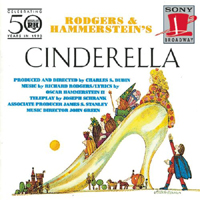 Television Cast, 1965 (Columbia)
Television Cast, 1965 (Columbia)  (1 / 5) The 1957 Cinderella telecast was a tremendous success, but since it wasn’t preserved on videotape, it quickly passed into legend. Eight years later, the property was ripe for remake — albeit without Julie Andrews, who was by then a big Hollywood star. Hammerstein had died, and the new production very much reflected the Rodgers-alone aesthetic: extremely “sincere,” no sly winks at the story, the whole of it done with solemnity. Changes such as turning “A Lovely Night” from a quartet into a solo were not improvements, and the interpolated “Loneliness of Evening” (cut from South Pacific) makes the show seem all the more funereal. As Cinderella, teenager Lesley Ann Warren tries to fill some very large glass slippers. While she displays a certain charm, her singing here is thin and uncertain, and she is not yet the assured performer she would later become. Stuart Damon’s prince is well sung but stodgy, and Celeste Holm is a synthetic Fairy Godmother. Only Pat Carroll and Barbara Ruick escape the gloom, but they have less opportunity to shine than did Ballard and Ghostley. Despite its inadequacies, the show was rerun numerous times. (In 1997, another TV version aired, with a cast headed by singer Brandy, Paolo Montalban, Bernadette Peters, Whitney Houston, Jason Alexander, Victor Garber, and Whoopi Goldberg. That production was commercially released only on home video, not on CD.) — R.B.
(1 / 5) The 1957 Cinderella telecast was a tremendous success, but since it wasn’t preserved on videotape, it quickly passed into legend. Eight years later, the property was ripe for remake — albeit without Julie Andrews, who was by then a big Hollywood star. Hammerstein had died, and the new production very much reflected the Rodgers-alone aesthetic: extremely “sincere,” no sly winks at the story, the whole of it done with solemnity. Changes such as turning “A Lovely Night” from a quartet into a solo were not improvements, and the interpolated “Loneliness of Evening” (cut from South Pacific) makes the show seem all the more funereal. As Cinderella, teenager Lesley Ann Warren tries to fill some very large glass slippers. While she displays a certain charm, her singing here is thin and uncertain, and she is not yet the assured performer she would later become. Stuart Damon’s prince is well sung but stodgy, and Celeste Holm is a synthetic Fairy Godmother. Only Pat Carroll and Barbara Ruick escape the gloom, but they have less opportunity to shine than did Ballard and Ghostley. Despite its inadequacies, the show was rerun numerous times. (In 1997, another TV version aired, with a cast headed by singer Brandy, Paolo Montalban, Bernadette Peters, Whitney Houston, Jason Alexander, Victor Garber, and Whoopi Goldberg. That production was commercially released only on home video, not on CD.) — R.B.
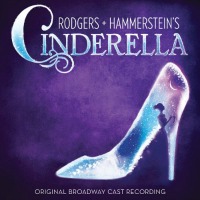 Broadway Cast, 2013 (Ghostlight)
Broadway Cast, 2013 (Ghostlight)  (2 / 5) You can’t keep a good score (or a familiar, beloved story) down. As noted above, Rodgers and Hammerstein’s made-for-TV fairy tale was adapted for the stage within a few years of that first sensational telecast, and numerous productions have followed. The most ambitious effort came with the show’s Broadway premiere in 2013, featuring a new book by Douglas Carter Beane. The King and Queen were omitted (or exiled), Cinderella was given a you-go-girl sense of empowerment, and once again there were songs from elsewhere in the R&H catalogue. (“Loneliness of Evening” came this time with altered lyrics.) The production was heavy on dazzle, the costumes won a Tony, and the show ran on Broadway for two years. Not surprisingly, the main virtue of this recording is the score, add-ons and all. Fortunately, there are some good voices singing it. While Laura Osnes does not always phrase with the utmost grace, her crystalline tone is both attractive and appropriate. Santino Fontana makes an endearing, truly charming prince, while Victoria Clark is luxury casting as the Godmother. Also in the deluxe realm is the marvelous Harriet Harris, though her stepmother doesn’t have much to do on the album. While never challenging Julie Andrews and the rest of the 1957 team, this is still Rodgers and Hammerstein, reasonably well performed — and that puts it well ahead of most of its Broadway competition. — R.B.
(2 / 5) You can’t keep a good score (or a familiar, beloved story) down. As noted above, Rodgers and Hammerstein’s made-for-TV fairy tale was adapted for the stage within a few years of that first sensational telecast, and numerous productions have followed. The most ambitious effort came with the show’s Broadway premiere in 2013, featuring a new book by Douglas Carter Beane. The King and Queen were omitted (or exiled), Cinderella was given a you-go-girl sense of empowerment, and once again there were songs from elsewhere in the R&H catalogue. (“Loneliness of Evening” came this time with altered lyrics.) The production was heavy on dazzle, the costumes won a Tony, and the show ran on Broadway for two years. Not surprisingly, the main virtue of this recording is the score, add-ons and all. Fortunately, there are some good voices singing it. While Laura Osnes does not always phrase with the utmost grace, her crystalline tone is both attractive and appropriate. Santino Fontana makes an endearing, truly charming prince, while Victoria Clark is luxury casting as the Godmother. Also in the deluxe realm is the marvelous Harriet Harris, though her stepmother doesn’t have much to do on the album. While never challenging Julie Andrews and the rest of the 1957 team, this is still Rodgers and Hammerstein, reasonably well performed — and that puts it well ahead of most of its Broadway competition. — R.B.


